








INTERVIEW




Ionly heard the term Megawatt Valley for the first time a few days ago – referring to the 14 power stations that once stood alongside the River Trent, churning out smoke and steam and supplying something like a quarter of the country’s energy needs.
It conjured a picture of post-war Britain, basking in the white heat of technology, exploiting its coal reserves to fire up the boilers that ran the turbines that produced electricity that made our manufacturers the best on earth.
But progress, and the realisation that industrial levels of carbon dioxide emissions were killing the world, meant it couldn’t last. West Burton A power station, in north Nottinghamshire, closed in March 2023 after 57 years of electricity generation. The UK’s last coal-fired power station, near junction 24 of the M1 at Ratcliffe-on-Soar, shut down a year ago. And this summer, Cottam power station’s eight cooling towers were demolished, breaking a Guinness World Record for the most brought down in one go.
But where one chapter closes, another one opens.
If you turn to the Focus pages this month, you’ll read that plans are underway to power big data centres using nuclear energy at Cottam. The project – costing around £11bn – could open vast new investment opportunities and create thousands of skilled construction jobs, as well as long-term roles. Meanwhile, UK Industrial Fusion Solutions is planning the UK’s first Spherical Tokamak for Energy Production (STEP) reactor five miles north of Cottam in West Burton.
According to Sho Dutta, the subject of this month’s Big Interview, the science behind fusion is sound, but the engineering is where work is still needed.
If they crack it – and £2.5bn of central government funding thinks they can – they could one day create vast amounts of green energy with only low-level radioactive waste.
Elsewhere this month there’s news on the work the Chamber is doing encouraging businesses to provide work for ex-offenders inside prison, and a report on where Leicester and Leicestershire are on the rocky road to devolution.
There's also news of a local filmmaker whose documentary was backed by Netflix, and updates on all the Chamber events planned for the coming months – including the allimportant Christmas celebrations.
I hope you enjoy the read.
Tom Pegden, Editor, Business Network

Editor Tom Pegden
T: 07816 347 451
E: tom.pegden@emc-dnl.co.uk
Contributor Tim Smith
Chamber Membership
E: membership@emc-dnl.co.uk
Follow the Chamber
W: www.emc-dnl.co.uk
Twitter: @EMChamberNews
•
Whenever
See page 51
regard.
Publishers Kemps Publishing Ltd 8, The Courtyard, 707 Warwick Road, Solihull, B91 3DA
T: 0121 765 4144
w: www.kempspublishing.co.uk
Managing Editor Laura Blake T: 0121 765 4144
E: laura.blake@kempspublishing.co.uk
Designer Lloyd Hollingworth
Advertising T: 0121 765 4144
E: andy.baker@kempspublishing.co.uk
Printers Stephens & George Print Group W: www.stephensandgeorge.co.uk
NETWORK is produced on behalf of East Midlands
(Derbyshire, Leicestershire, Nottinghamshire) by
and
and
OCTOBER 2025
MEMBER NEWS
4 Next is bucking the High Street trend
APPOINTMENTS
16 Housing group names non-executive director
THE BIG INTERVIEW
19 Sho Dutta, a director on the STEP Fusion programme at UK Industrial Fusion Solutions
STRATEGIC PARTNERS AND PATRONS
24 Business Club teams up with local charity
CHAMBER NEWS
26 Chamber on shortlist for national honour
CHAMBER NETWORKS
32 Events will help Generation Next members finish the year on a high
TRAINING & EVENTS
36 Our round-up of this year’s East Midlands Sustainability and CSR Conference
SUSTAINABLE EAST MIDLANDS
38 Geneticist is helping to save gibbons
INTERNATIONAL TRADE
40 Chamber offers a wide range of international courses and support for businesses
POLITICS
42 Event puts devolution in the spotlight
FEATURES
44 ENTERPRISE & INNOVATION
How to successfully digitise your business
46 Innovation for small businesses
48 FOCUS
Business Network rounds up the ongoing battle to make energy production clean, renewable and efficient
54 FUTURE TECHNOLOGIES
How drones are revolutionising surveying
56 The AI moment for SMBs: From intimidation to innovation
DIGITAL & TECHNOLOGY
58 Helping businesses to grow online
BUSINESS SUPPORT
61 LEGAL
Top award for Buckles solicitor
62FINANCE
The importance of due diligence when expanding your business
64SKILLS
Teaming up to boost skills agenda
66 PROPERTY
Construction group builds for the future
68MOTORING
Nick Jones test drives the iconic Mazda MX-5
THE LAST WORD
70 Chamber president Dawn Whitemore on making the energy market fit industry needs

High Street giant Next continues to thrive despite the subdued high street environment, with pre-tax profits rising almost 14% in the first half of the year to £515m.
The Leicestershireheadquartered group said total sales for the period were up more than 10% year-on-year to £3.25bn.
The business anticipates profits for the full year of £1.1bn, up 9.3%.
‘Where teams have been bolder in adopting new trends and improving quality, success has followed’
It comes after latest figures from the ONS showed British retail sales rose just 0.1% in the three months to August.
In half year results signed off by Next chief executive Simon Wolfson, the business – which is usually quite conservative in its updates – said it had successfully dealt with the “structural shift” from store to online trading, and saw growth opportunities in “virtually every area of the business”.
It said: “There is a palpable increase in creative energy in


Rmemorandums of understanding with the governments of western and south Australia, outlining its commitment to collaborate on building skills within the defence sectors of both states.




The agreement marks a step forward in preparations for the AUKUS submarine programme, which will provide Australia with its first conventionally armed nuclear navy –powered by Rolls-Royce reactors.
Under the agreements, the western and south Australian governments, working with RollsRoyce, will create a highly-skilled workforce, addressing a skills gaps for current and future defence projects.
Rolls-Royce has powered Royal Navy nuclear submarines for more than 65 years and is expanding its Derby site to support both UK and


Next’s product departments.
“They are delivering newness –new trends, fabrics, prints and shapes – while striving to deliver quality that exceeds our customers’ expectations at every price level.
“Where teams have been bolder in adopting new trends and improving quality, success has followed.
“That energy extends to the development of our growing portfolio of new brands, licences and third-party brands.
“Alongside these endeavours to improve both our product and platform – and in part as a result of them – the Next brand has
continued to gain traction in overseas markets, giving us a new avenue of profitable growth.
“Encouragingly, we are also seeing good international growth from our other wholly-owned brands and licences.
“By Next standards, the last few paragraphs might sound a little gushing. A worrying state of affairs for any business – particularly so following a season where favourable weather and competitor disruption have enhanced our performance.
“Rest assured, the company’s enthusiasm for its many opportunities is grounded in a cautious realism.”



It is the only private company in the world capable of managing reactor design, manufacturing and decommissioning.
Rolls-Royce Submarines will provide the nuclear reactor plants to power new attack submarines as part of a tri-lateral agreement between Australia, the UK and US.
Rolls-Royce Submarines president Steve Carlier said: “We

East Midlands Chamber is hosting three Christmas celebrations this December, instead of the usual one.

part in the development of the next generation of attack submarines for the Royal Navy, and equally proud to be supporting Australia in their mission to introduce nuclear powered submarines to their fleet.
“Nuclear submarines bring unsurpassed endurance, range, stealth, power and reliability that still provide the absolute pinnacle of military advantage.”

Two years after being saved from closure, a Derby shop is not only surviving, it’s thriving – with turnover up by more than 70%.
Castle Blinds, based in Chaddesden, has seen its order book more than double since being bought out by former employee Myles Hayhurst in 2023.
Myles, who is a trained carpenter, stepped in when the previous owners decided to sell the business after 26 years. Since then, Castle Blinds has gone from strength to strength – expanding its team with three new employees, extending its premises and adding two new vans to its fleet.
It now counts Derbyshire County Cricket Club, HUUB, Hannells, JCB and Derby County Football Club
among its commercial clients.
Other notable names include Wathall’s, MasterMover, Derby City Council and Queen’s Hospital, in Burton.
Myles said: “While we still provide plenty of residential customers with curtains and blinds, the commercial side of the business has grown enormously over the last two years.
“We’ve taken on some really significant projects and built relationships with organisations we’re proud to work with.
"Securing contracts with names like Derby County and JCB has been a huge boost, not just financially but for the team’s confidence too. It shows we’re moving in the right direction.”
The annual “Cheers to the Year” Christmas dinner in Leicester will be held on 5 December at the city’s Grand Hotel, featuring a threecourse meal and “magical” entertainment.

This year it will be complemented by a Derbyshire Christmas Networking Lunch on 2 December at Breadsall Priory, and a Festive Networking Lunch at the Motorpoint Arena, Nottingham on 8 December.
Tickets are on sale for all three events.
Chamber chief executive Scott Knowles said: “The Chamber Christmas Lunch has always been a highlight of the festive calendar –perfectly placed in early December when business minds are turning to the year ahead, while also taking a well-earned moment to celebrate the successes of the year gone by.
“Whether you're looking to spark new collaborations, meet future clients or simply grow your professional network, the Christmas Lunch offers a relaxed and elegant

setting to do just that – with a touch of seasonal magic. And this year we won’t just be in Leicester, but Nottingham and Derby as well.
“With food, festive drink and a room full of East Midlands business leaders, it’s the ideal way to kick off the Christmas season.”
Tickets are available to Chamber members and non-members at: https://is.gd/LGTbEl
To find out about sponsorship opportunities, email caroline.lucy@emc-dnl.co.uk
Profits are up at Nottinghambased corporate energy supplier and meter operator Yu Group, on the back of growing revenues.
Pre-tax profits at the company rose 14% in the first six months of 2025 to £22.6m. Revenues were up 9% at £341m.
Yu Group, which is listed on the AIM market, said it had seen strong growth in the number of meter points it was supplying and that strong trading partnerships continued to bear fruit.
Chief executive Bobby Kalar (pictured) said: “The group has delivered a resilient first half with performance in line with management expectations, against the backdrop of a normalising commodity market.
“Meter point growth has remained strong, supporting our operational momentum and strengthening our position in the market.
“Strong cash generation during the period has enabled further material dividend growth whilst retaining ample earnings coverage, reinforcing our confidence in

delivering against our targets.
“Our forward contract book continues to expand despite recent declines in wholesale energy prices, providing a solid platform for the remainder of the year and beyond.
“We remain focused on disciplined execution of our strategy, maintaining financial strength while delivering long-term shareholder value.”
The business has also announced the appointment of Andy Simpson as chief financial officer, replacing Paul Rawson, who remains on the board as a non-executive director.


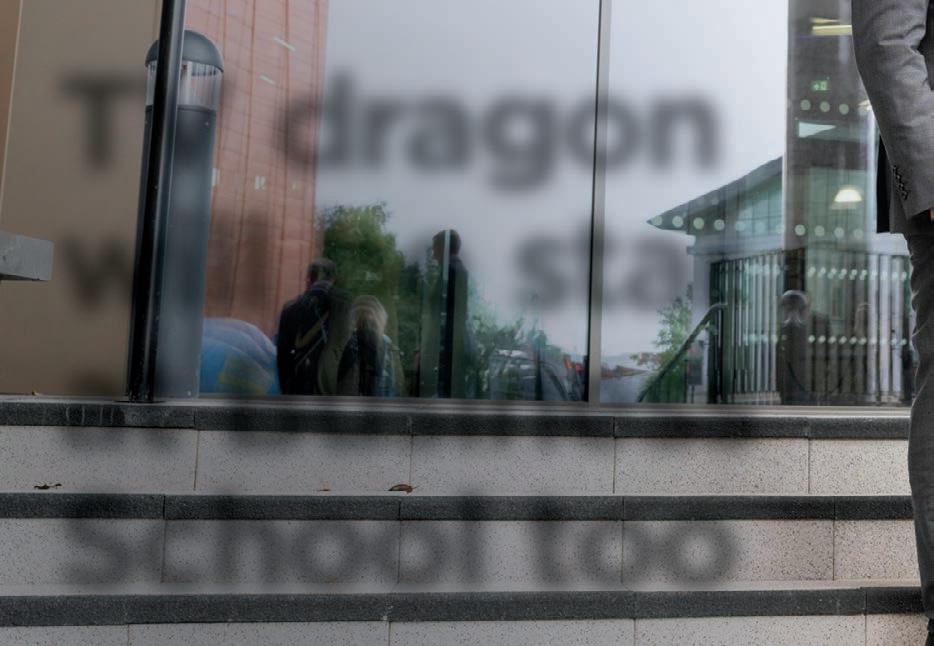
TV entrepreneur Theo Paphitis joined VIP guests for the opening of the University of Derby’s state-of-the-art business school building.
During the launch event for The Cavendish Building, the TV Dragon was announced as visiting professor of entrepreneurship, which will see him share his expertise with students, to inspire and mentor the next generation of business leaders.
He will also work alongside university chancellor and chair of the Devonshire Group, Lord William Burlington, to lead a new Chancellor’s Entrepreneurs Club, which will help drive business education in the city.
Theo Paphitis said: “I am
delighted to join the University of Derby as their visiting professor of entrepreneurship.
‘A symbol of our commitment to delivering worldclass education’
“I will draw on my decades of business experience to support the university’s commitment to putting entrepreneurship front and centre –encouraging the students of Derby to turn ambition into opportunity.”
Professor Kathryn Mitchell CBE DL, university vice-chancellor and chief executive, said: “The opening
of The Cavendish Building marks a defining moment for the University of Derby.
“This is more than just a building – it is a symbol of our commitment to delivering world-class education, rooted in real-world experience and global thinking.
“By working in close partnership with industry, we are setting a blueprint for how universities can empower students to graduate with the skills, knowledge and networks they need to lead, innovate and thrive in a fast-changing world.”
The launch brought together influential voices in global business, VIP guests, and key civic stakeholders for a day of discussion, insight and celebration.
Guests had an opportunity to


explore the seven-storey building and its cutting-edge facilities, including a fully equipped trading floor with Bloomberg and London Stock Exchange terminals, a specialist supply chain lab and an extended reality suite to develop learning in a virtual environment.
The opening event also saw the launch of the UK’s first Institute of Carbonomics – a research institute dedicated to reshaping how businesses reduce emissions and transition to a low-carbon economy.



Five category winners from the 2024 East Midlands Chamber Business Awards have been nominated and shortlisted for the national British Chambers of Commerce Awards 2025:
• People and Work Business of the Year – Howes Percival
• Local Economy of the Future Business of the Year –Melita POS Ltd
Black Iron, the in-house restaurant at Winstanley House, Leicester, has been crowned steak house of the year at the Midlands Food, Drink & Hospitality Awards 2025, for its “commitment to exceptional quality, locally sourced ingredients and unforgettable dining experiences”.
Black Iron has built a reputation for its contemporary approach to traditional cooking, specialising in open-flame grilled steaks and premium British produce. The menu combines seasonal ingredients with “expertly curated” wines and craft cocktails, making it a popular destination restaurant.
Chief executive Kiran Parmar said: "It’s a huge honour and a real testament to the hard work and passion of our entire team – from the chefs in the kitchen to the front-of-house staff who bring the Black Iron experience to life every day.”

• Green Innovation Business of the Year – FSG Tableware Ltd
• Global Britain Business of the Year – Valve and Process Solutions Ltd
• Digital Revolution Business of the Year – The Carpenter’s Arms (Midlands) Trust
All shortlisted entries will be assessed by an independent panel. Regional winners will be

announced on Thursday 2 October and once that stage is complete, national winners will be notified on Thursday 23 October.




The Canal & River Trust, Leicestershire and Rutland Wildlife Trust and Leicester City Council – funded by the National Lottery Heritage Fund – are working to restore the River Soar and Grand Union Canal between West Bridge and Watermead Park.
Critical to the success of this project is involving as many stakeholders as possible, so they are keen to hear from businesses near the waterway to get their thoughts.
A spokeswoman said: “We are in the initial development phase of the project but if successful, this project could bring in vital additional funding to rejuvenate the area.”
To get in touch, email Sue Willis at: sue.willis@ canalrivertrust.org.uk
Tony Brooks (pictured), founder of The Leadership Training Workshop, which celebrates its 18th anniversary this year, offers 18 key insights into strong leadership.
1. Leaders can have the greatest skills in strategy, planning and communication, but managing destructive thinking and realising your potential needs work.
2. Your vision needs to be worked on with your team and shared with them. Have an aspirational threeyear vision, then drill down to oneyear, then a 90-day plan that is specific and realistic.
3. Develop your identity – both for you and your organisation.
4. Work on habits and behaviours. From daily behaviour to habits such as strategy and keeping on top of financials.
5. At the end of each day, plan your next day to avoid being too reactive and make time for important, non-urgent things such as strategy and planning.
6. Ensure team meetings and one-to-ones have a clear agenda and outcomes. Give praise for jobs well done.
7. Develop and nurture contacts.
One day the positive energy will come back to you.
8. Make time, ideally away from the office, for physical and psychological space. That’s where you have your best ideas.
9. Never neglect life outside work. Family, friends and hobbies.
10. Celebrate the good stuff and learn from mistakes. Capture at least five good things about each day, and celebrate especially good stuff. When things go wrong, see it as a learning opportunity.
11. Develop yourself continuously. Read, listen to podcasts, go to seminars and training courses, or hire a coach.
12. Look after your health. Don’t let nagging issues go without being looked into.
13. Be agile. Be ready to change plans speedily and make bold decisions.
14. Enjoy what you do. If not, it’s time to either change the way we are seeing things or change what we do.

15. Don’t take too much on your shoulders. Delegating, outsource, consult, work with suppliers and partners.
16. Be bold, move out of your comfort zone and take risks. But one step at a time.
17. Future proof your business. For instance, if you don’t have an AI strategy, develop one.
18. Focus on your NEWS. Not TV news but your Nutrition, Exercise, Water (hydration) and Sleep. Score yourself out of 10 for each: sevens or less need fixing.





Businesses looking to start a podcast can avoid the cost and hassle of hiring a studio thanks to a new on-site service from Loughborough content marketing consultancy LikeMind Media.
Its new ‘Podcast Studio To You’ service means clients can record a professional-quality podcast in the comfort of their own premises.
The package includes microphones, headphones, a mixing desk, all cables and equipment, and a dedicated podcast producer to coach participants and ensure a smooth session.
LikeMind Media founder Paul Ince said: “Podcasts are one of the most powerful ways for businesses to showcase their expertise and

build a real human connection with their audience.
“But for many, the barriers of cost, time and equipment can feel overwhelming. With Podcast Studio To You, we remove all of that — we bring the studio to you, so you just focus on sharing your story.”
The service has already been put into action with Timm’s Solicitors in Derby, which uses the service to record its own show, The Legal Rabbit Hole, helping demystify the law.
Timms senior associate Sharon Jeffrey said: “By being at our premises, our team was able to minimise disruption to our working day, which in turn has huge benefits for our clients.”
Cosy Direct has been included in the 2025 UK’s Best Workplaces in Retail, Hospitality & Leisure list by Great Place To Work UK.
The list was compiled using anonymous staff feedback, and suggests that Cosy provides a workplace where people feel “valued, trusted and proud to contribute”. To qualify for the list, companies need at least 65% positive feedback, and Cosy got 79%.
Managing director David Hook said: “We’re proud to be recognised as a Best Workplace 2025, especially because this recognition comes directly from our team at Cosy. Their trust, passion, and collaboration are what make our culture thrive. This is proof that together we are building something truly special.”





There’s a bit in the documentary short BAND where a 14-year-old David Chabeaux passes out playing trumpet for the Derby Serenaders marching band in France.
He had had a seizure back in the UK but was carried onto the bus for the trip across the Channel, nonetheless.
Holding back tears, he tells viewers, “the band always came first”.
The scene, captured in half century old archive footage, sums up the total dedication that went into making the Serenaders not just the best in the East Midlands but one of the best in the world.
Pretty much the whole of David’s extended family was involved –mum, dad, aunts, uncles, cousins, even great-grandparents.
At the centre was his grandfather Maurice (Moz) Ward –the driving force and leader, and someone who struck the fear of god into the competition.
As David puts it: “The band was more important than life.”
It’s an achingly personal story about ordinary everyday people doing extraordinary things.
David and director Owen Tooth made the film after beating thousands of other entries to receive the Netflix Talent Documentary Fund Award, and the pair are now talking of making a feature length version.
BAND was an official selection entry in last summer’s Raindance film festival – the biggest independent film festival in Britain – and could, just maybe, be


considered for a Bafta or even an Oscar. The beauty is the subtlety in the grainy footage telling the story, held together by interviews with David’s family.
His background is a mix of Big Band singing as a young man, followed by a corporate life as a leadership consultant – working with the Chamber among others –and a love for acting which has seen roles in Peaky Blinders, Hollyoaks, Sky One’s Bulletproof and a Bollywood film called Gold.
He tends to be cast as baddies.
Owen, meanwhile, is an established director who studied and has taught at the University of Derby and lives just outside the city.
He has a background working on documentaries and films –including a horror called Devil’s Tower starring Jay and Silent Bob star Jason Mewes – and TV shows including Horrible Histories which, he said, was “a dream come true”.

1. The BAND film poster
2. David Chabeaux (centre) with his dad Brian Bell and mum (and Moz’s daughter) Shirley
3. David Chabeaux (left) with film director Owen Tooth
‘The other bands were terrified of them. What interested me was just how far they were willing to go’
This year he became the first director in a wheelchair to direct Eastenders, overseeing the week of touching episodes to mark the 80th anniversary of VE Day.
The pair met working on a short film – filmed over a freezing cold night in Nottingham – and the idea for Band came when a former member of the Serenader’s bumped into David and told him how inspirational his granddad had been. The conversation would become a catalyst for David turning it into a film.
Owen said: “David had a lot of ideas and some amazing stories and the first thing I said was we need to just get together and watch the footage, and figure out what to do – some of the things David was telling me were incredible.
“In more than 40 years they never placed outside the top three, winning something like 400 gold medals, all over the world.

“And the other bands were terrified of them. What interested me was just how far they were willing to go.
“It became a question of life and death at times, and if it meant winning a competition there was no question about the level of sacrifice needed.”
He also wanted it to be something David’s family could be proud of. After pitching the idea of looking at the band as something akin to a cult, Netflix decided to fund the pair.
Owen said: “As soon as we opened that door, the story just flooded out. So much of what we had been talking about suddenly made sense.”
David said: “The idea of it being like a cult is inferred throughout, but the first rule of documentaries is to share a story and let the audience make their own conclusions.
“The experience was hugely cathartic in a way I didn’t expect.
"The fact that it's available in its entirety for free on YouTube makes it all the better.
“We’re both so proud of it and delighted to share it with everyone in Derbyshire, where it all began.”
To watch the film search “BAND, Midlands, Netflix” on YouTube.
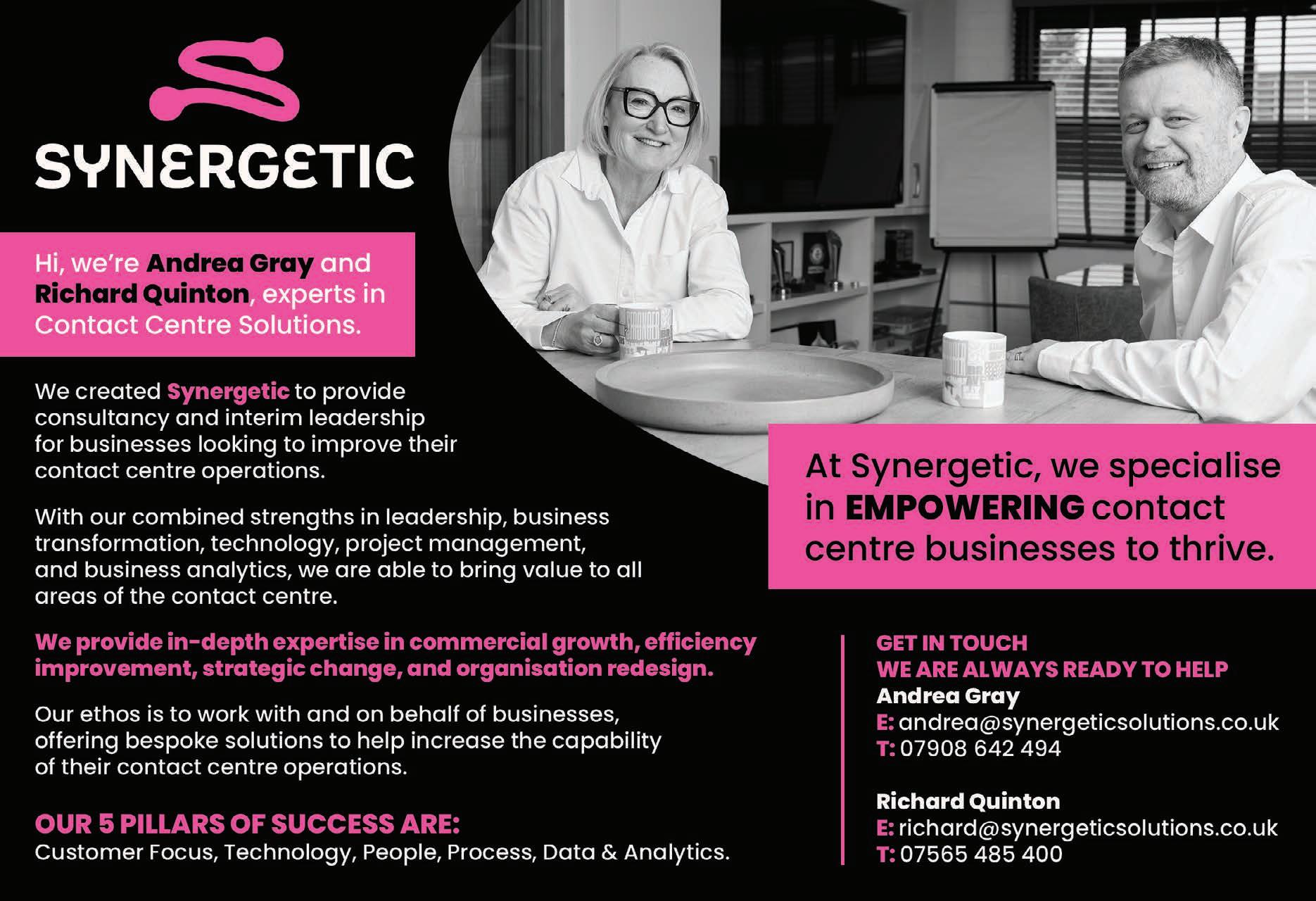






Cass Vranjkovic (pictured), lead technology specialist at IT support group NetMonkeys, says practical AI toolkits for today’s workplace are out there
Navigating the landscape of AI can feel overwhelming, with a new tool promising to revolutionise your business every week. But beyond the hype, there are practical platforms available that can genuinely streamline operations and create new capacity in your team.
First, consider information management. Tools like Notion are introducing AI-powered call transcriptions, integrating them directly into their powerful organisational systems. For more visual collaboration, Miro offers a suite of templates and integrations perfect for workshops, helping teams move from brainstorming to polished product designs and processes. Meanwhile, NotebookLM allows you to feed it large volumes of text such as company briefs, then have a conversation with it to identify key details or project trends. Next is the challenge of content creation and communication.
‘There are practical platforms available that can genuinely streamline operations and create new capacity”
Gamma AI has become an indispensable tool for generating professional documents and presentations with remarkable speed, making the modest monthly subscription a worthy investment.
For customer interaction, ElevenLabs offers the ability to embed a voice chat on your website, trained on your FAQs to provide instant, conversational support to visitors, freeing up your team to handle more complex enquiries.
Another area seeing rapid change is personal productivity, particularly email and calendar management. New AI assistants like Fyxer AI are tackling this head-


on. These can automatically colourcode your inbox to prioritise messages, learn your specific tone of voice to auto-generate replies, and even manage your calendar. Some can join meetings on your behalf to take notes, turning your inbox from a reactive chore into a streamlined workflow.
The real power, however, comes from intelligent automation. If you’re a Microsoft-based business, Power Automate can build workflows that include an API call –think of it as a connection to an AI model like Gemini or ChatGPT. This allows you to handle unstructured text from emails, analysing them for trends, identifying common questions, or even extracting key information into a structured file.
For those not on Microsoft, n8n is an excellent alternative. Imagine
a workflow that receives an email with an attachment, like a customer query or a supplier invoice, and uses AI to understand its content and take the appropriate next step, based on context rather than just keywords. It’s about building systems that both carry out work for you and provide insight into your operations.
Ultimately, many platforms perform similar functions under different marketing labels. The key is to look past the branding and focus on what you actually need to do. Are you extracting information? Analysing data? Comparing options? Generating content? Breaking your needs down this way makes it far easier to identify the right tool, ensuring you’re investing in genuine solutions, not just the latest trend.
A telecoms broker has been helping the BBC highlight scammers who allegedly arrange phone deals for businesses then tie them into rip-off contracts.
Dave Millett says BBC investigators had received hundreds of complaints from businesses – including many SMEs that can’t afford to waste cash – who claimed they had fallen for dodgy sales practices, just like double glazing scams in past decades. He said even GPs said they had had been targeted.
Dave, who runs DRF Consultants, in Matlock, said: “All industries suffer from unscrupulous suppliers trying to make money at the expense of small businesses. But the BBC has discovered that some telecoms suppliers are taking this to extreme lengths.
“After a long investigation they found some companies had been tricked into signing contracts that meant they were overpaying many times compared to normal prices – one company was paying £50,000 for five VoIP phones and their software.
“The BBC undertook secret undercover filming to capture one of the salesmen making his pitch and then highlighting all the ways the customer was potentially being misled.

“Companies all over the country including the East Midlands have been targeted and left facing ruinous bills which are extremely difficult to escape. It has led to some businesses being forced into liquidation because they cannot afford the costs.
“The BBC are continuing to investigate further as they believe this is the tip of the iceberg and are keen to hear from more companies that have suffered in a similar way.”
Dave said businesses considering new contracts should:
• Never ever sign telecoms paperwork at the sales meetings – companies may say there is a cooling-off period but often there isn’t
• Get written confirmation that no new services or charges will be added during the period of the contract without your express consent –companies use opt-out emails to add multiple extra charges for services you do not need
• If asked to sign in multiple places – be very suspicious. You could be signing up to leases, additional services or different contract lengths
• Always ask for an itemised breakdown of costs – equipment, software, services etc, and if possible, get the total cost of the contract over the life of it.
• Avoid lease agreements. There is no need for software to be put in a lease – most companies charge it monthly anyway.
• Confirm the contract duration – none should be for more than three years.
• Confirm if you add any new users you won’t end up with an “overhang” when the contract ends, making it difficult to change suppliers.
• Get them to explain in full early termination charges.
• Get written confirmation there is no auto renewal clause.
• Get the salesman to confirm any promises or commitments in writing.

By Dr Nik Kotecha OBE DL (pictured below), chairman and founder of RandalSun Capital.
The Festival of Light arrives once more and greets us with the messages of the spiritual victory of good over evil, the central role of family and the importance of the communities in which we live.
That community, for me and for many of you I'm sure, is a global community.
Throughout the year, but especially at this time friends we know, and friends we're yet to meet are in my thoughts.
By friends I'm yet to meet, I mean people across the globe with whom we share the world! Of these, for far too many, peace in their communities is out of reach.
‘My hope for Diwali 2025 is that the months ahead will bring respite, rebuilding and recovery’
The light of Diwali may seem far from their homes, and distant from their families as unrest, political stress and wars dominate their worlds.
In communities, such as those in Sudan, Ukraine and Gaza, periods of war have now overshadowed lives for several years. Sustained unrest brings more than human loss alone, dismantling essential infrastructure, and displacing hundreds of thousands of people.
Children are being orphaned, entire communities traumatised, and the level of destruction means some regions may take decades to recover.
Diwali brings a powerful pause around the world, giving us time for reflection and a reminder of the importance of the connections we hold with those around us – no matter their background.
Diwali crosses cultural barriers and encourages us to involve everyone in our communities to celebrate. Unity and inclusivity define Diwali, and differences as well as those things which we share can be equally recognised, celebrated and respected.
We can stand together with family, friends, neighbours, communities – and share in the light




and joy that celebrating Diwali guides us towards. Symbolising optimism, renewal and togetherness, the messages of Diwali show us that no matter how overwhelming immediate challenges may appear, they can be overcome with faith, courage and unity.
Each illuminated Diya on Diwali night illuminates the windowsill or mantle it is placed upon. It gently lights the room, and its light permeates our homes. Perhaps it lights the street through a window too, and illuminates our neighbourhoods. Each light dispels the darkness around it, and with each Diya lit, the light prevails, dispelling even the darkest corners.
This light, of course, is symbolic – symbolising the triumph of good over evil, and around the world right now, there is great need for this rejuvenating light.
Through our family foundation this year we have, I hope, brought light into communities we've been able to reach through powerful partnerships, in the UK and globally.
The Randal Foundation has forged connections with organisations who share our values, and strive as we do, to save lives. This year our partnership with Milan-based NGO, EMERGENCY, will see over 90,000 lives saved and tens of thousands more lives significantly improved as, together, we bring medical aid, supplies and clinical care to those in need, in countries affected by war, unrest and extreme poverty.
Through the values of Sathya (truth), Dharma (righteousness), Shanti (peace), Prema (love) and Ahimsa (non-violence), Diwali reminds us that each act of kindness we undertake, and the resilience we show helps us towards a brighter future for all.
Such acts, no matter whether small or large, project positivity and harmony into the world around us and strengthen the bonds between us.
My hope for Diwali 2025 is that the months ahead will bring respite, rebuilding and recovery wherever there are troubles and that the centrifugal effects of hope, kindness and compassion will resonate – not only across our hearts and homes, but through all our communities too, wherever they are in the world.
29 new members joined the Chamber in August:
• Amtech Int UK
• Anchor Global Partners
• Arthur Johnson & Sons
• Ashgates Corporate Services
• Auction News
• Auditel
• Compass Changing Lives (Derbyshire)
• DRF Consultants
• Flowmondo
• Great Northern Classics
• Halo Bookkeeping and Accounting
• Here Self-Storage
• Holiday Inn Derby Nottingham
• IN Freight Solutions
• Juggling Octopus
• Loughborough College
• LucenAI
• Macs AI Solutions
• Nottingham Venues
• Pipi Print and Packaging
• Purple House Clinic Nottingham
• Severn Trent Stakeholder Engagement Team
• Shivering Mountain Distillery
• Soulistic Shamanism and Psychotherapy
• Tennant Metallurgical Group
• Tithe Green Natural Burial
• Translate-A-Bill
• Web Design Experts
• Whimsy Woods



A newly qualified solicitor at Timms Solicitors has joined the wills and probate team in Swadlincote.
Sophie Wildsmith joined the firm’s in-house trainee solicitor programme in 2024, having been a conveyancing assistant in the Burton office.
In her new role she will also help the team with matters concerning deeds of variation, lasting powers of attorney and trusts.
Sophie graduated from Nottingham Trent University with a firstclass law degree in 2021 and attained a distinction in her legal practice course and masters of law at the University of Law in 2023.

WBR Group, the UK’s biggest independent provider of SSASs (small, self-administered pension schemes) and integrated professional services, has appointed Jenni Harland (pictured left) as director of SSAS operations and Abigail House (right) as SSAS proposition manager.
Jenni joined WBR in July 2021 as pensions operations leader, bringing with her more than nine years of SSAS experience, having previously held roles at Talbot and Muir and The Pensions Partnership. She has looked after a large portfolio of SSASs during her time


at WBR, dealing with cases of a complex nature, which has expanded her technical skills.
Abigail has joined WBR with more than 15 years of experience in financial services.
She started her career at Lloyds TSB, before moving to HSBC and more recently was head of strategy and propositions at Alltrust.
Throughout her career, Abigail has collaborated with product, marketing, compliance and transformation teams to align their work with regulatory requirements, market trends and evolving customer expectations.
Platform Housing Group has welcomed Jane Porter as a nonexecutive director.
Jane, who also sits on the group’s audit and risk committee, will strengthen its governance by adding to the board’s “diverse and robust” commercial experience.
She has worked in housing for more than 30 years and is an experienced non-executive director who has served on regulatory advisory groups.
As former chief operating officer at Southern Housing, she led operations for more than 79,000 homes, with responsibility for major business functions and a £500m budget.

Earlier this year, she was awarded the lifetime achievement award by the London-based Women in Social Housing.

Shannon Edwards-Owen has joined DBCP’s apprentice programme.
The former Parkside School student has joined the provider of building control services in Derbyshire and Staffordshire Moorlands, as a level 2 business administration apprentice.
It marks a career change for Shannon (23), who was previously a teaching assistant in Sheffield, having completed a foundation degree in working with young people and families at Sheffield Hallam University.
Shannon said: “The apprenticeship with DBCP offers me the chance to build a career in a business environment, which is something I had become increasingly curious about.”
As part of her 18-month apprenticeship, she is attending Chesterfield College one day per week, with the remaining time spent gaining hands-on experience at DBCP which has a longstanding record of supporting apprentices and investing in future professionals.
She has joined DBCP’s business administration team, which is based in Dunston, Chesterfield.
• Elsewhere in the business, registered building inspector Luke Merrey has joined DBCP’s team of inspectors covering High Peak and Staffordshire Moorlands.

National accountancy and advisory firm
MHA has recruited eight trainees in the Midlands as part of its 2025 graduate and apprentice recruitment intake.
They are among 130 new trainees across 21 UK and Ireland offices, working within the audit, tax and advisory teams. The ‘Class of 2025’ were officially introduced at the firm’s annual trainee induction event in Birmingham.

Tasawar Rahim has qualified as an architect at IMA Architects, marking the culmination of years of dedicated study and professional development.
Tasawar has completed his final examinations and is now registered with the Architects Registration Board (ARB).
His achievement represents the successful completion of a rigorous pathway that combines academic study, practice-based experience and professional assessment.
Tasawar joined IMA in 2022 and is the second member of the IMA team to qualify as an architect this year, following director Joe Travers who completed his RIBA qualification in June.
Managing director Ben Hall said: “We are incredibly proud of Tas and the dedication he has shown in reaching this important milestone.
“Qualifying as an architect requires a great deal of hard work and persistence, and Tas has balanced this brilliantly with delivering high-quality work for our clients.”
The eight Midlands recruits will work across the Birmingham and Leicester offices.
Managing partner and group chairman Rakesh Shaunak said: “2025 has already been a momentous year for MHA, seeing the firm floating on the London Stock Exchange’s AIM Market and also expanding our reach in the EU through acquisitions.
“As we continue on our ambitious growth
journey, it’s imperative we recruit outstanding people at all levels of the firm.
“Our annual trainee intake enables us to consistently grow our talent pool, giving us the skills and knowledge our clients need both now and in the future.”
The firm has opened applications for its 2026 trainee intake and applicants can find out more on the MHA website careers page.
Leadership expert Tim Brogan has become managing director of digital marketing agency Alphageek Digital.
The firm, based in Friar Gate, Derby, hopes the appointment will sharpen its strategic focus, strengthen client partnerships and accelerate growth.
Formerly a headteacher –most recently as head of St Alban’s Catholic Voluntary Academy in Chaddesden –and inspector, Tim has held various leadership, executive coaching and mentoring roles and is passionate about turning big ideas into tangible action and helping to develop individuals to the highest level.
The 41-year-old has been in talks with the agency for several years and has taken over the MD role from co-founder Art Lindop.

While Tim will focus on business development, Art will move into the role of technical director, building the agency’s reputation for technical innovation and service excellence.
Tim, a father of four, said: “Having spent the last two years really getting to know Alphageek – from their clients to their internal opportunities – I feel well-placed to lead with insight and intent, building on what already makes the company strong.
“Art’s technical expertise and unwavering commitment to client outcomes remain central to our business. My focus will be on strengthening our strategic direction, expanding our capabilities and fostering an environment where our team and clients can thrive.
“I joke that I had the world’s longest interview with Alphageek –because I was actually in talks with them for several years. But we waited until the time was right for me personally and for the company.”
Gordon Campbell, emeritus professor of renaissance studies at the University of Leicester, has been elected to the Royal Society of Canada.
His election to what is the senior national council of Canadian scholars is his third recognition by an academy – he is also a fellow of the British Academy and a member of Academia Europaea.
Professor Campbell was born in England but went to school and university in Canada. He is a leading researcher of the poet John Milton and of the King James Bible, editing the 400th anniversary edition in 2010, which was used by King Charles to recite the Coronation Oath in 2023.
The edition was also bought for every school in Britain by David Cameron.
Prof Campbell is also a public orator, having given the eulogy at the burial of King Richard III in Leicester in 2015.
He joined the university of Leicester in 1979.

emeritus professor of renaissance studies at the University of Leicester



Business Network meets Sho Dutta, a director on the STEP Fusion programme, to find out about plans to develop a fusion power plant in north Nottinghamshire
MEETING THE PEOPLE BEHIND THE REGION’S TOP BUSINESSES




As new technology goes –particularly technology that could one day produce clean, green energy and play a significant part in mitigating climate change –fusion sounds too good to be true, writes Tom Pegden
Right now, scientists around the world are trying to work out a way of using the same principle that powers the sun and the stars to smash (or fuse) hydrogen atoms together and create vast amounts of energy.
The science behind it is good: the aptly named International Thermonuclear Experimental Reactor in the south of France is already close to completing its small-scale fusion
But the big hurdle – and something the UK Government is investing the best part of £2.5bn into – is in making the process efficient enough to get more energy out than goes in in the first place.


To that end, UK Industrial Fusion Solutions (UKIFS), a wholly-owned subsidiary of the UK Atomic Energy Authority, has been tasked with developing Britain’s plans for a prototype fusion power plant.
All being well it hopes to have the UK’s first Spherical Tokamak for Energy Production (STEP) machine up and running on the former West Burton power station site in north
Nottinghamshire, by 2040. The investment is such that the scale of the operation will be on a par with the huge construction project under way at Hinkley Point C in Somerset.
If 2040 seems a long way off, even then it will be a pilot project, potentially producing a fraction of what the finished plants could be producing if and when they are rolled out across the country in the decades that follow.
Fusion like fission, doesn’t emit carbon dioxide or other greenhouse gases, but crucially it is much safer than traditional nuclear power plants. Sho Dutta, director of supply chain and commercial on the STEP programme, said one of the advantages is that it avoids most of the risks and hazardous waste of traditional fission nuclear reactions –where radioactive plutonium or uranium atoms are used to create an energy-releasing chain reaction.


He said: “There's two aspects to the safety.
“One of the biggest issues around fission is the concept of runaway reactions. It's what caused the disaster at Chernobyl, and it's what’s effectively behind the atomic bomb.
“If you don't control the fission reactions appropriately, the reactions will run away from you and create a scenario which you can't recover from.

‘Fusion is very different in that the natural state of fusion is not to fuse – so you will never have a runaway reaction’
“Fusion is very different in that the natural state of fusion is not to fuse – so you will never have a runaway reaction. If you lose stability in fusion, it will just shut down.
“Point number two is that the level of radioactive waste in fusion – both the level and the volume – are far, far lower than you get in fission.
“That is one of the reasons why the regulator for fusion energy in the UK is not the ONR, the Office of Nuclear Regulation, but it's a combination of the Environment Agency and Health and Safety Executive.
“That government policy was decided a few years ago and demonstrates that it doesn’t need the nuclear regulator because it’s a health and safety and an environmental matter – because it's safer.”
The process works by fusing hydrogen isotopes inside a high-pressure plant and under an almost unimaginable temperature of 150 million degrees C.
(Sho says there was a point last year when scientists at the Culham Centre for Fusion Energy ran fusion experiments at temperatures
hotter than the sun’s core – for a short time it was possibly the hottest place in the universe.)
The fusion reaction occurs inside a superheated plasma, which is held in place by powerful magnets. In fact, millions of fusion reactions happen every second – with mass turning to energy in line with Einstein’s E=mc2 equation – with the potential to create a lot of energy from a small amount of fuel.
The process heats water that turns to steam, which turns turbines and makes electricity –which is similar, in principle, to conventional power plants.
Tokamak refers to the design of the machine which harnesses the energy of fusion. It is shaped like an apple with the core removed where the reaction takes place. The energy produced is absorbed as heat in the walls.
The STEP Fusion pilot plant is expected to generate around 100 megawatts (MW) of net power (taking away the energy needed to run it) – which could theoretically supply more than 50,000 homes.
It will act as a stepping stone on the way to designing and building a finished

This summer, the UK Atomic Energy Authority (UKAEA) and East Midlands Combined County Authority (EMCCA) agreed a 20-year collaboration to advance the training and skills needed to make fusion energy commercially viable.
The collaboration will focus on the skills –including apprenticeships and other vocational training programmes – to support the STEP project over the coming years.
An economic impact assessment published in the spring calculated that by the time it is operational, the West Burton site could accommodate 6,500 full-time jobs across STEP and the surrounding business park, equivalent to 12.5% of the current total workplace jobs in Bassetlaw.
UKAEA says it is committed to facilitating the training of the next generation of British scientists and engineers, and the EMCCA-led collaboration will bring together the best of the existing provision – including training and skills providers and universities – to help the region to meet the skills needs of the globally significant clean energy programme.
Initial training will focus on the engineering and project skills needed to complete plant design, with construction and operational skills as focus areas for future stages of the programme.
Permissions and consents will be sought for construction to begin in the early 2030s, with the prototype powerplant targeting first operations in 2040.
Claire Ward, mayor of the East Midlands, said: “The East Midlands is planning for our energy future today, and fusion energy is an exciting part of that future.

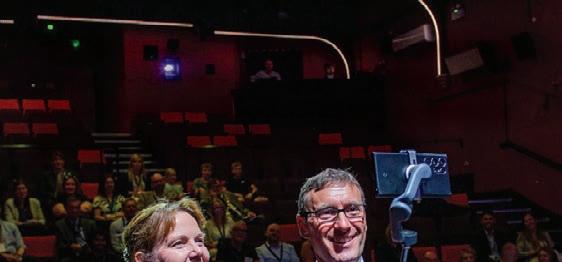

“One day – thanks to the Nottinghamshirebased STEP programme – the whole region will benefit from clean, affordable fusion energy.
“Right now, my priority is ensuring that local people can get the jobs associated with developing this new industry and its supply chains.”
Paul Methven, chief executive of UK Industrial Fusion Solutions, said: “Delivering STEP, and commercial fusion beyond that, will require a strong skills pipeline, not only in STEM subjects, but in every aspect of running a complex business.
“It is fantastic to see that UKAEA are leading on putting this essential enabler in place now to ensure local people benefit directly from the programme, in addition to ensuring we have the skills needed to deliver STEP.”

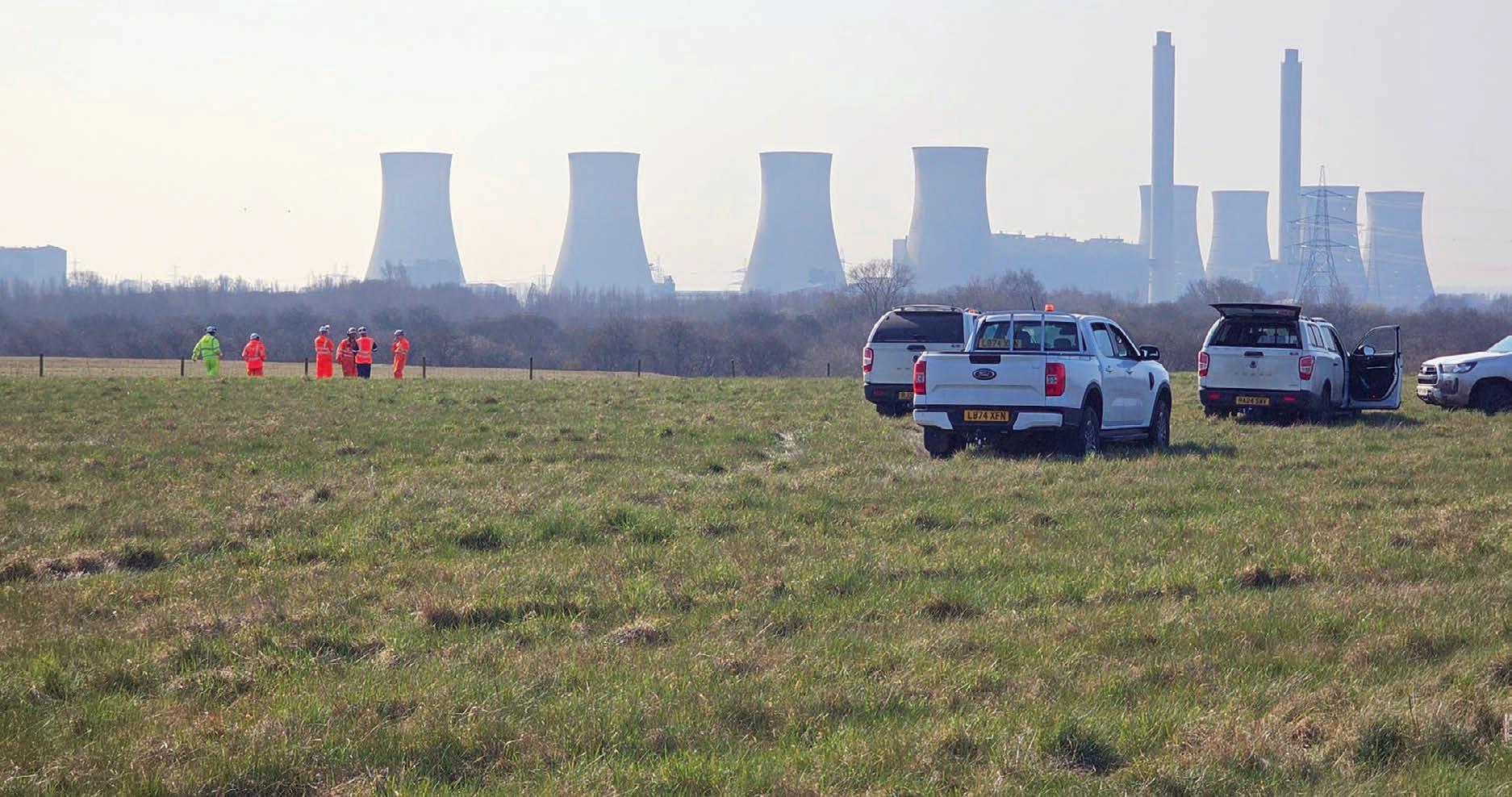
version that would be 10 times more powerful and, crucially, commercially viable.
As a comparison, EDF’s two fission reactors –using established engineering – going up at Hinkley Point C could one day provide enough electricity for around 6 million homes.
The beauty of fusion, though, is that as well as being cleaner, it has the potential to be three or four times more efficient.
So, it could also play a valuable part in maintaining the UK’s energy security in the light of global obstacles to oil supplies and an increasingly unstable global energy market.
Today there are around 180 people working on STEP Fusion for UK Industrial Fusion Solutions, including some at West Burton ahead of the eight cooling towers being brought down and the site being flattened ahead of construction work.
The wider programme, including staff from the UK Atomic Energy Authority who are providing fusion science expertise, takes the figure to around 500.
Right now, most of the work is based at Culham in Oxfordshire, but eventually STEP Fusion will have its permanent home at West Burton and create thousands of jobs.
There are three phases to the prototype plans.
The first, £220m phase, was focused on the concept and development of the organisation, as well as choosing a site and getting the infrastructure and regulatory framework in place.
Phase two, which is where we are now, is working with academia and industry to develop the programme and design the actual machine.
All-being well, the third phase will get underway in the 2030s and will see work begin on constructing the infrastructure, buildings and the actual STEP fusion plant.
The hope is for the “on” button to be switched in the 2040s.
The STEP Fusion team recently hosted Invest in Nottingham and Marketing Nottingham for a site tour of the former West Burton power station.
The business is working closely with local organisations to share the project’s fusion journey, raise awareness and connect with businesses.
Marketing Nottingham chief executive Megan Powell Vreeswijk said: “This is bringing pure, clean, green energy, so the research is happening here, and the investment is coming here.
“For the region this will have a massive economic impact, and for the nation we’re going to be the leaders in fusion energy technology.
Sho explained: “To get to that point is still going to take a considerable amount of time.
“The first step is to demonstrate that it's actually technically achievable and commercially viable at scale.
“Because, if building fusion power plants costs more than you can sell the energy for, who's going to buy it?
“Ultimately, you could say the goal is that fusion energy becomes the dominant energy source globally, but I wouldn't say that that is going to happen in either of our lifetimes.
“But we're certainly going to make damn good progress towards achieving that. And our view is that if you can get to 100MW, you'll get to a gigawatt.”
Sho’s part in all this is as the commercial and
‘You can already see examples of labs around the world saying they’ve got an energy gain out of fusion experimentation’

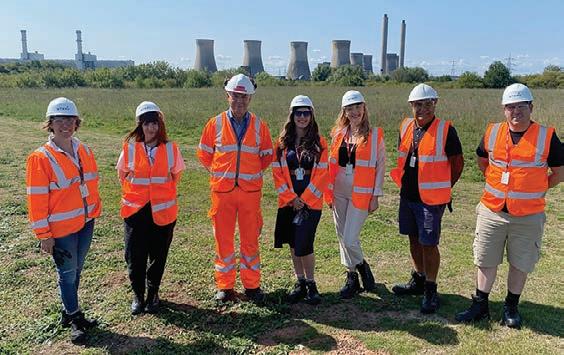
“These are really exciting times, and we can’t wait to promote this as an opportunity for investment.”
supply chain director for UKIFS – basically looking after all the third-party relationships that the organisation needs to have in place to deliver STEP.
Intensive conversations with supply chain partners are ongoing. Only last month STEP Fusion announced it was extending a collaboration with Seoul National University and Korean tech firm PowerNix to design hightemperature superconducting cables.
The partnership has already come up with a prototype cable which has been tested in Switzerland and shown to withstand huge electromagnetic forces and extreme temperatures.
The next stage of the project will focus on developing and making the cables for commercial use.
Each collaboration like that is part of the process of piecing together the £2.5bn STEP Fusion jigsaw.
Sho said: “For me the science is understood and can be demonstrated. The challenge is turning it into an engineering reality.

“But you can already see examples of labs around the world saying they've got an energy gain out of fusion experimentation… it’s the furthest they've gone in terms of demonstrating the viability of fusion.
“The science is there and has been demonstrated at laboratory scale. The challenge is now how do we demonstrate it on an almost industrial scale.
“The target has always been 2040.
“It sounds like a long time, but it's pretty ambitious because of all the technology and engineering challenges we still need to find solutions for.
“I guess time will tell, as we start scaling up some of this technology, how realistic 2040 is. But it’s what we are aiming for.
“The work we’re doing is also about developing supply chains that might not currently exist – for instance, we might need a certain type of high temperature superconducting magnet. There's a magnet
supply chain that exists out there, but not at the capacity that we will require.
“So, part of our challenge is how do we enable supply chains to develop, to deliver the kind of solutions we know we'll need in 10 years’ time.
“The size and scale of STEP at its peak will be comparable to something like Hinkley Point C.
“In terms of fusion, we know China have got a national fusion programme as have member states of the EU. The challenge for us is maintaining collaboration, while competing as a nation – maintaining a lead in global fusion technology in the UK.
“France has a big demonstration machine called ITER in the South of France – which is a big global collaboration – though it's not an actual power plant, and Germany is building up a programme as well.”
Sho said if the UK pilot is a success,, it shouldn’t be too difficult getting to 1GW at the next step.

Only then will they be able to start talking about building commercial fusion power plants. How many there would be across the UK is hard to say.
“That’s a really tough question to answer. Plant number two is not going to be the same as plant number one. We'll learn a whole bunch of stuff making that first plant, which will then be taken forward into plant number two.
“At what point does that become a UK wide fleet? I wouldn't want to guess.
“This is not a rinse and repeat thing – we're not at the stage of technology maturity where we could definitely say this is 100% going to work.
“The reality is, until it's actually built and commissioned – despite all the modelling we’ve done that suggests it's going to work – we won't know exactly how it's operating.
“So, for me or anybody to sit here to say, “if it all goes according to plan by 2040, by 2100 you're going to have 50 of these”, is for the birds.
“The goal is to prove it at scale and then we’ll see what we can do.
“But every year that passes, we get more confident. Part of that is because all the computational effort and modelling that previously would have taken months and months to do, can be done much quicker through AI.
“So, the rate of technology development will get quicker over the next few years which means that by the time we get to having a built plant, we are going to be pretty confident that it's going to work.
“It genuinely will be the first of its kind anywhere.
“I've always worked in engineering fields, but in established engineering and technology, and coming into a programme like this where you can feel the enthusiasm and the passion of the scientists and engineers, trying to genuinely work out a problem that no one has got their head around, is infectious.
“It's really energising to see so many people working on something that ultimately could change the world.”



Recruiters aim to go hire and hire
Management at ER Recruitment say it is marking a period of significant growth in its 12th year, particularly in the executive recruitment space.
The Leicester-based business has also strengthened its role as a strategic partner of the Chamber in the past few months, contributing to initiatives that drive skills, leadership and business growth in the region.
Managing director Eileen Perry MBE DL continues to champion female entrepreneurship as co-chair of Enterprising Women, while business and marketing manager Scarlett Canavan is helping shape the next generation of business leaders as chair of Generation Next.
The firm remains actively involved in initiatives that support talent development, including the ongoing BrightER Futures programme in partnership with fellow strategic partner DMU, and has renewed its commitment as speaker theatre sponsor for patron Love Business, delivered through EMA Training.
Eileen said: “Our success over the past 12 years comes down to the trust we’ve built with the businesses and individuals we work with.
“We see ourselves as true partners, understanding the challenges, ambitions, and values behind every role to make connections that truly fit, while making a positive difference within our region.”

The Hope Business Club and the Ian & Clare Mattioli Charitable Trust – supported by Mattioli Woods – are working in partnership to support the innovative and life-changing cancer research being done by Hope Against Cancer in Leicester.
The partnership will “strengthen ties with the business community, increase awareness of local cancer research initiatives and the importance of financial planning in supporting such causes, and generate financial support for local cancer research through joint events and initiatives”.
The Ian & Clare Mattioli Charitable Trust promotes “community, diversity and compassion” with the aim of creating a caring society for the benefit of all.
Ian is a co-founder of Mattioli Woods, which is supporting the partnership. The business has more than 30 years experience proving financial support for 16,000 clients, and has raised £500,000 for charitable efforts.
The Hope Business Club is a partnership between local businesses

and local charity and contributions made by members, along with other corporate supporters, have supported world-class local cancer research and care in the East Midlands.
Ian Mattioli MBE DL Hon LLD, said: “As a Leicester-based charitable trust, and having built Mattioli Woods from this city into a company with over 1,000 employees and looking after £16bn worth of other families' investments, we’re proud to support the Hope Against Cancer Business Club.


“Cancer is something that affects far too many of us including me and my family, and we believe that the business community has a vital role to play – not just in funding research, but in raising awareness and building connections that accelerate impact.”
Nigel Rose, chief executive at Hope Against Cancer said: “The work of the Ian & Clare Mattioli Charitable Trust exemplifies the very best of philanthropy where businesses are prepared to really invest in the communities within which they work.”

The countdown has begun for one of the big events in the East Midlands business calendar – the Love Business Expo 2026.
EMA Training, which hosts the Expo, has launched the latest campaign with a fresh commitment to its mission of bring the region’s business community together under one roof to “share ideas, create connections and spark opportunities”.
The Holywell Park Conference Centre in Loughborough will become the home of the region’s biggest business networking event on Thursday, 12 February, 2026.
Gemma Orton, strategic partnerships and marketing director at EMA Training, said: “We’re proud to stand at the centre of the East Midlands
business community, providing a platform where collaboration, opportunity and inspiration can thrive. Hosting the Love Business Expo allows us to create a space where conversations begin and partnerships are born – and that’s something we’re truly passionate about.”
The 2026 event will see EMA Training once again join forces with partners and sponsors, including East Midlands Chamber as headline sponsor, ER Recruitment as speaker theatre sponsor as well as Quiet Storm Solutions, founders of Love Business which will be in its 14th year.
Visit www.lovebusinessexp.co.uk to book a stand or register for complimentary delegate passes.

celebrates its

Niche Magazine Leicester and the Niche Business Awards have been acquired by Nady Ghaly, chief executive and founder of Niche Magazine - Middle East and the Bebrand Advertising Agency.
Founded by Leicester entrepreneur Jenny Cross in June 2013, Niche Magazine has grown to become a leading B2B publication in Leicester and Leicestershire, known for its strong readership and ties to the business community.
In 2014, the brand launched the Niche Business Awards, which have expanded year-on-year, with the most recent Bollywood-themed ceremony in September welcoming hundreds of business leaders and celebrating Leicester’s vibrant and diverse community.
‘It has been a privilege to watch Niche become part of Leicester’s business DNA’
Jenny said the change in ownership signalled a new era for Niche, with the brand becoming part of a global family already established in Egypt, Saudi Arabia, the UAE and Italy.
She said: “This moment feels like the natural next step for Niche. From home-growing the magazine and awards from scratch to building a community and a brand that businesses trust, it has been a privilege to watch Niche become part of Leicester’s business DNA. I look forward to seeing it expand under Nady’s leadership, continuing to play a meaningful role in supporting and connecting businesses.”
Nady Ghaly said: “I have been watching the impressive growth of Niche Magazine and the Niche Business Awards in Leicester for many years.
“What Jenny and her team have built is extraordinary – a trusted platform and a community that continues to inspire.
“I am excited to bring the UK into our international family and to expand the Niche vision across even more markets.”
Jenny said the international acquisition meant that the “heritage, reputation, and community spirit” that Niche had nurtured over the past 12 years would now reach an even wider stage, connecting Leicester’s business excellence to a global audience.
• Leicestershire’s most inspiring entrepreneurs, community leaders, and high-growth businesses were honoured at the 11th annual Niche Business Awards, held at Athena.
The winners were: Rose & Nancy – best new business; Kara Healthcare – best family business; The Health Suite – business growth; Stateside Distribution – best small business; Kara Healthcare –employer of the year; Rebecca Holders, Holders Estate Agents – rising star; Nitesh Somani, Kara Healthcare – businessperson of the year; The Bridge (East Midlands) – best customer service; Steve Boorman, Anthony James Insurance Brokers –entrepreneur of the year; The Health Suite –professional services; Voyager – creative; The Belmont Hotel – hospitality; Abacus Flooring Solutions – sustainability; Focus – Leicestershire charity of the year; Louise Coleman, Messy Senses –community champion; Chris Shaw, Think Funding –judges’ award.
Community trailblazers have been celebrated for their dedication and impact at the University of Derby’s Civic Awards.
Now in its second year, the awards recognise the impact that individuals and organisations have made across the city and county.
An honorary civic award was presented to David Walsh, a firefighter who co-founded charity Sporting Communities. It helps atrisk individuals, young people and their families with the aim of reducing the number going into care.
Rachel Morris was given a civic hero award for her work with the Friends of Derby 500 Club, which has raised more than £65,000 for worthy causes across the city, including buying sensory toys for a terminally ill child and a laptop for a homeless teenager working his way towards university.
University vice-chancellor and chief executive Professor Kathryn Mitchell CBE DL said: “The University of Derby’s Civic Awards shine a spotlight on individuals who are making a meaningful difference in our community, recognising their contributions and inspiring others to become ambassadors for positive change and impact.
“As a civic institution, we are committed to supporting communities within our city and county, and are delighted to celebrate this year’s award recipients, whose dedication and commitment are so well deserved.”
An intergenerational civic award was presented to Avtar Singh Jawanda, who has supported a number of initiatives across Derby, including delivering food parcels to the homeless and helping provide free education programmes for children in underprivileged areas.
Some 50 civic student and staff champions were celebrated for their work giving back to the city and county in which they study.







By Ian Stefanuti
(
), head of technical & environmental operations at Christeyns Professional Hygiene UK, in Whaley Bridge, which has 90 staff.
Our business has operated within the High Peak for 35 years and has grown from a small start-up to being part of a multimillion-pound global business. Company values have always been the same – to consistently provide the quality cleaning products that businesses need in order to maintain cleanliness and hygiene in the professional cleaning sector.


The British Chambers of Commerce has announced East Midlands Chamber as a finalist for UK Chamber of the Year 2025.
The distinguished title is awarded to one of the 51 accredited chambers of commerce that make up the BCC network.
The major focus is on manufacturing, but customers can expect added value services such as safety training, white labelled products, design/marketing and regulatory support. Customers are mostly in the UK, although more recently our export business has grown through being part of a larger group of companies.
In 2018 the company was purchased by Christeyns and since then a lot of change has occurred, combined with extensive investment. We’ve bought more space, integrated robotics into two of our fastest filling lines, purchased solar panels, added more manufacturing capability, more warehousing, more equipment.
Perhaps more importantly we’ve invested in people. We like to think that our employees are part of a family where they can expect occupational health advice, wellbeing/mental health support and opportunities for progression within the business.
Operating from the Peak District area can offer challenges as well as benefits – snow can be an issue in

Business Peak District (BPD) is a free membership organisation for businesses in the Peak District National Park, High Peak, Staffordshire Moorlands and Derbyshire Dales. Its principal supporter is East Midlands Chamber. To find out more email: members@businesspeak district.com
the winter for logistics. However, a central location does offer access to both sides of the country. More recently we’ve been engaging with Derbyshire Wildlife Trust through the ‘Wild Peak’ initiative so that we can more professionally manage the extensive green spaces around our site. We’ve carried out surveys, collected samples and planted trees. This all counts towards our carbon reduction targets.
Business Peak District has helped us to understand other local businesses. There are opportunities for collaboration and networking which we would not find anywhere else. Meeting people face-to-face is still incredibly valuable.
The winner will be announced at the BCC awards in October, recognising a chamber that delivers growth and prosperity to the UK and local community.
‘Being shortlisted for this prestigious title is testament to the sheer dedication and hard work of the East Midlands Chamber team’
Recent accomplishments of East Midlands Chamber include the delivery of a £4.6m UKSPF-funded Accelerator project which, since 2023m, has included:
• Support for 13,617 firms
• £9.7m secured in business support, grants and loans
• 1,101 jobs created and secured
• Decarbonisation plans created for 1,093 firms
• 2,607 firms helped to increase productivity
• 196 new exporters created
• 143 new businesses set up
• 400 SMEs adopting new and emerging technologies
Chamber chief executive Scott Knowles said: “UK Chamber of the Year is the highest level of recognition a chamber of commerce in England, Wales, Scotland or Northern Ireland can get, so to be announced as a finalist is tremendous.
“The 51 chambers of commerce that make up the British Chambers of Commerce network collectively drive economic growth, representing the interests and amplifying the voices of businesses the length and breadth of the UK.
“Being shortlisted for this prestigious title is testament to the sheer dedication and hard work of the East Midlands Chamber team, underlining their commitment to championing the business community every day and leading growth across Derbyshire, Nottinghamshire and Leicestershire.”


East Midlands Chamber is helping businesses provide invaluable work and training for prisoners.
The Chamber has partnered with His Majesty’s Prison and Probation Service (HMPPS) to promote its Working Week pilot project – where five prisons are getting millions of pounds of extra investment to give exoffenders work that could potentially turn their lives around.
Midlands businesses heard firsthand about the opportunities and support on offer during a tour of HMP Ranby, in Retford, Nottinghamshire, where they spoke to prison staff and prisoners as well as representatives of companies such as Pennine Healthcare and Specialised Canvas which already work with prisoners.
They also heard from Sir Nic Dakin MP about the Government’s plans to break the cycle of reoffending.
The Government wants to improve offenders’ access to purposeful activity, including linking prisons with employers and the voluntary sector to get them into work on the outside.
The hope is that providing prisoners with a vocation can help breed a sense of pride, give them training and provide them with a work ethic.
Ranby has 1,100 prisoners and its existing workshops offer them a chance to supplement their allowances in jobs such as manufacturing, metalwork, engineering, laundry and textiles.
‘Smaller businesses might not have the resources to consider these sorts of opportunities, so hopefully the Chamber can act as a bridge’
Working Week takes that up a level, providing a fulltime working week and better pay. There are three Working Week workshops at Ranby at the moment, and 30 prisoners signed up with the aim of taking that to 120. The scheme can also give businesses a UKbased manufacturing partner and access to good quality equipment.
Prisoners told Business Network the work got them out of their cells and gave them an extra few pounds a week for things such as noodles, phone credits, stamps, vapes and toiletries. One, an alcoholic and class A drug user for 40 years serving a six-year and eight-month sentence, said having a job in one of the workshops had given him a renewed purpose.
The 54-year-old from Crewe said: “This is the longest time in my life that I’ve been clean. This has given me my self-respect back – it’s not just a job. I’m 100% looking forward to life on the outside, addressing my mental health issues and getting rid of all my baggage. I can’t see any negatives.”
Another prisoner – who said he was on an indeterminate sentence, given to serious offenders who pose a significant risk to the public – said he earned £32 a week making electrical switches which, he said, amounted to “a lot in jail”.
He said: “This is one of the better workshops and is steady and keeps us busy. I’m a troubled prisoner because my sentence can’t be made any longer than it already is – you can imagine the mental health problems with that – so this has helped me a lot because it’s given me a routine. It’s helped me massively. I’ve started to go to the gym, whereas a few months ago I was tearing the place to bits.”
Steph Simpson is general manager of Specialised Canvas which employs more than 100 people at its industrial sewing factory in Chesterfield. It already works with Ranby, and she is interested in the broader Working Week programme.
She said: “The benefit to the prison is that it gets the men working and builds their knowledge in textiles. As a sewing factory we struggle to find male machinists –some of the things we make are quite heavy and cumbersome – so it provides a potential for prisoners to work with us on release.”
Chamber chief executive Scott Knowles said many businesses had recruitment problems and more are coming around to the idea of employing ex-offenders. He said: “It’s great to hear about the work big companies like Pennine Healthcare are doing in prisons. Conversely, smaller businesses might not have the resources to consider these sorts of opportunities, so hopefully the Chamber can act as a bridge because there is great scope for businesses to work with HMP Ranby and other prisons.”
To discuss work in HMP Ranby or employment on release opportunities, contact community engagement manager Linda Sobolewski at Linda.Sobolewski@justice.gov.uk


East Midlands Chamber has called for supportive policies in the upcoming Autumn Budget to protect firms from additional costs, after the latest GDP figures from the Office for National Statistics showed no growth in July.
Director of policy and insight Richard Blackmore said: “Seeing a growth slowdown in this second half of the year will raise the concern of businesses, especially with the Autumn Budget not far away.
“Any additional cost burden must be avoided – a point that’s only amplified when you consider the pressure firms have been under and the East Midlands data we’ve gathered from hundreds of firms across the region showing fragile confidence.
“Businesses have had to foot higher employer National Insurance contributions, a higher national living wage and inflation shot up to 3.8% in July. These factors have made for an extremely challenging trading environment.
“Findings, in multiple measures, right across the board in our Quarterly Economic Survey have laid bare the extent of challenges businesses in our region are facing, with only three out of 10 East Midlands businesses saying they expect increased profitability over the next 12 months, while inflation and corporate taxation top the list of concerns.
“Political leaders still have an opportunity to listen to the needs of firms and remove some of the obstacles they are faced with.
“To support our members across the East Midlands, we have contacted politicians and called for essential changes to the Employment Rights Bill, at a crucial time before the Bill is signed off with Royal Assent. Changing the key parts of that Bill would avoid additional pressure placed on firms with paperwork and associated costs.
“Government has already asked a lot from business. Firms will be looking to the Autumn Budget on 26 November, where it is essential they are not hit with further tax hikes that would add to the mountain of tough challenges they have had to navigate.”

Heating technology
manufacturer Vaillant has been confirmed as headline sponsor for Derbyshire’s 2025/26 East Midlands Chamber Business Awards.
Taking place at Derby County Football Club on 26 March 2026, the Derbyshire Business Awards will recognise standout firms across 12 categories covering areas such as digital transformation, apprenticeships and people development.
As one of the area’s largest employers, Vaillant is proud of its heritage and ongoing commitment and investment into manufacturing in Derbyshire. Its Glow-worm brand has been producing boiler products locally since 1934, expanding to include production of Vaillant boilers from the site in Belper in the early 2000s.
Vaillant is helping to lead the UK’s transition to low carbon heating technology and in 2022 added a dedicated heat pump line at its Belper site to produce aroTHERM plus air source heat pumps. The company recently invested a further £40m into a new factory in Derby to manufacture newly designed high recovery cylinders.
The Chamber is also hosting

‘Awards play a vital role in celebrating the outstanding achievements of businesses’
Awards for Leicestershire businesses on 26 February, 2026, at Leicester City Football Club and in Nottinghamshire on 12 March, 2026, at Nottingham Belfry. Judging is now under way, and tickets are available at: www.emcdnl.co.uk/services/business-awards/ Finalists for each of the award categories will be revealed at the Chamber President’s Celebration of Success on October 9.
Vaillant Group UK and Ireland managing director Henrik Hansen said: “We are incredibly proud to



sponsor the East Midlands Chamber Business Awards 2025/26.
“These awards play a vital role in celebrating the outstanding achievements of businesses across our region, showcasing their innovation, resilience and contribution to the local economy.
“Sponsoring this event aligns perfectly with our values of quality, innovation and sustainability and it gives us the opportunity to give back to the community that has supported us for so many years.


“By sponsoring these awards, we aim to not only celebrate the incredible talent and hard work in the East Midlands but also to encourage continued growth and excellence in our region.”
Chamber chief executive Scott Knowles said: “As a major employer in Derbyshire, that’s passionate about the county, community and has decades of success under its belt, Vaillant is perfectly placed to help represent one of the most significant events in the region’s business calendar.”


Craig Pearson
Winning a category in the Chamber’s Business Awards is a great way to raise the profile of a business, according to a past winner and sponsor of the 2026 Awards.
Eastwood-based Your IT Department is sponsoring the Small Business of the Year category at the Nottingham Business Awards, which take place at Nottingham Belfry on Thursday 12 March, 2026.
The IT consultancy is a past winner in the same category, and won the Excellence in Customer Service Award in 2022.
The business also recently signed up as a Chamber patron in order to benefit from more of the networking and marketing opportunities East Midlands Chamber has to offer.
Craig Pearson, its head of sales and marketing, said: “We often describe ourselves as a customer service company that happens to know a lot about technology, so winning the Excellence in Customer Service Award was a key one for us.
“It feels great to win something like that – it puts the company on the map and gets the name out. It’s also good recognition for the
employees. Everyone within the business got behind it and enjoyed the fact that we had been recognised for all our hard work.
“We have enjoyed the Awards over the years – and will enter some such as Apprentice of the Year again – but decided that we wanted to give something back to the business community, so sponsoring the Awards this year was a nice way to do that.”
Your IT Department was launched in 2009 and today employs 23 people, providing services ranging from IT support to cyber security, AI and general IT consultancy work for SMEs.
Craig said it was typically seeing 20% yearon-year growth and expected to hit £3m turnover this year.
Clients come from all sectors, with most based in the East Midlands. Recently the team has been helping Leicestershire County Cricket Club with a five-year cloud IT strategy.
To book tickets for the awards visit: www.emc-dnl.co.uk/services/businessawards/
Craig Brothers (pictured), owner of Nottinghamshire-based digital transformation consultancy Six Degrees Associates, writes about the part his home has played in shaping his career.
Country of my heart” is a phrase DH Lawrence used to describe the Nottinghamshire countryside where he grew up, specifically the area around his hometown of Eastwood. He often referenced it in his writings, both in novels and poetry, as a place of deep personal significance.
Living a mere two miles from where DH Lawrence was born and raised ensures there are constant reminders of his works.
Lawrence had mixed views about his birthplace, but Nottinghamshire did hold a dear place in his heart.
I too have a strong connection to my home county. My family history stems from southern Ireland, my paternal grandfather crossing the water to lay down roots as a miner following the Second World War.
‘Nottingham and the East Midlands always remained the backbone of my story’
My parents were immersed in local industry, my father as a BT engineer, helping keep Nottinghamshire Police HQ communications working, my mother running a driving school.
Along I came in September 1974, born and raised in the county, going on to study at Nottingham Bluecoat School and Nottingham Trent University, then establishing my first business at NBV offices, opposite where I lived as a toddler in industrial Basford.
I have also raised my daughter in Nottingham, where she now works as an apprentice planning and property solicitor, our fourth family generation now helping the East Midlands to grow.
DH Lawrence wrote a number of his works as he travelled the world, with his birthplace a key inspiration. Although I’ve not been as lucky as DH Lawrence with

regards to overseas travel, my agency endeavours led me to work on projects originating in Japan, Germany, USA, Croatia, India and Portugal, among others.
But Nottingham and the East Midlands always remained the backbone of my story.
As I began to consider the next stage of my career my focus pivoted as I became involved with East Midlands Chamber and Nottingham Trent University; joining the boards, offering business insights and working on operational projects.
In February 2022 I left agency life to focus on my two passions: engagement through marketing and technology; the growth of the East Midlands. Six Degrees had set sail!
From 2022-2024 Six Degrees led on a Chamber digital transformation project – Kinder Scout – with the aim of supporting its goal of helping East Midlands businesses and communities. An indepth view of this exciting project can be seen on the Six Degrees website.
I now look forward to progressing Six Degrees, working with East Midlands SMEs, taking all the influences that I have consciously and sub-consciously banked throughout my East Midlands life, from those early sights, sounds and smells of the bustling Nottinghamshire industrial landscape to my local education, overseas career focus as well as Chamber and university roles.
Take control of rising energy costs with tailored solar and battery systems designed to futureproof your business and protect your bottom line.
At Fusion Solar UK, we help UK businesses cut costs, boost energy security and unlock grant funding – because profit starts with energy independence.
The rising cost of electricity is now one of the biggest threats to business profitability. From manufacturers and farms to offices and workshops, companies of all sizes are feeling the pressure. With no price caps on commercial energy, unpredictability is the new normal – but there is a solution.
At Fusion Solar UK, we believe energy independence is no longer optional. It’s the key to stabilising overheads, protecting profit margins and building a more resilient business for the future.
We’re not your typical solar company. As a family-owned business rooted in the heart of the UK, we understand that no two businesses are the same. That’s why we offer bespoke solar PV, battery storage and EV charging solutions, designed to meet the unique energy needs of your operation.
Whether you're a farm battling rising production costs, a business park owner looking to add longterm value to your property, or a manufacturer concerned about grid reliability, our tailored approach delivers real results.
Solar isn't just about panels on a roof – it’s about taking control. Our expert team handles the process from initial site surveys and system design to installation, aftercare, and ongoing support. We also work with trusted grant specialists and offer commercial finance options, making it easier than ever to make the switch to renewable energy.
The benefits of energy independence speak for themselves:
• Protect your business from rising energy costs: Generate your own clean electricity on-site and reduce reliance on unpredictable energy markets.
• Unlock grant funding: We partner with grant specialists to help you access available funding, often covering a significant portion of your project costs.
• Boost profitability and ROI: Solar systems typically pay for themselves in just a few years, delivering savings for decades to come.
• Enhance business sustainability: Future customers and stakeholders care about your green credentials. Solar demonstrates your commitment to a cleaner future.
• Battery storage maximises efficiency: Store surplus energy and use it when needed, reducing grid reliance even further.
At Fusion Solar UK, our experienced team works with businesses across sectors including agriculture, manufacturing, property, hospitality, and more. Our recent projects include large-scale rooftop installations, groundmounted systems for farms and integrated solar and battery packages for commercial premises. We know switching to solar is a big decision – but with the right partner, it’s straightforward and hassle-free. From your first consultation to final commissioning, we provide honest advice, transparent pricing and a solution that works for your business.
If you’re ready to reduce costs, take back control, and future-proof your business with solar, now is the time to act. With energy prices climbing and grant schemes available, there’s never been a smarter time to invest in your business energy independence.



ACCELERATOR SUPPORT RECEIVED: 1-2-1 advice, energy audit, grants and workshops
IMPACT: Job creation and safeguarding, increased turnover and upskilled workforce
Blue Stamp Travel specialises in tailor-made cultural tours, language courses and work experience abroad.
Working in international markets means this Chamber member business is exposed to the volatility of the exchange rate. At the same time, it wants to become a more sustainable business and develop a growing portfolio of destinations and organise more trips, which requires more staff.
The business recently benefitted from an £8,000 High Growth Accelerator grant to develop a trip planning portal to manage enquiries, quotes, bookings and trip delivery. Since launching the platform with the support of a £2,500 Business Growth Grant from Gedling Borough Council, the business has been able to deliver more packages.
After improving its group trip web pages and refining the way it quotes, the business expects Accelerator support to increase the number of enquiries for group travel and more bookings. In anticipation of that, it has appointed a new member of staff.
Managing director Steve Manderson said: “Maintaining and developing the bespoke technology that sits behind so many of the company systems and operations is an ongoing labour of love.
“The support we have received through the Accelerator programme has allowed us to grow and enhance our offer at a much faster rate than would otherwise be possible.”
Businesses in Derbyshire and Nottinghamshire can apply for a £2,000 subsidy to attend a Chamber Commercial training course including:
• Director Development (five days): Commencing 20 November, Chesterfield
• Managers Development (four days): Commencing 13 January, Chesterfield
• Effective Team Leader (two days): Commencing 3 December, Nottingham
The upcoming schedule can be accessed on the Chamber’s Events pages www.emc-dnl.co.uk/events.
For more information, contact Vicki Thompson, head of skills at East Midlands Chamber: vicki.thompson@emc-dnl.co.uk
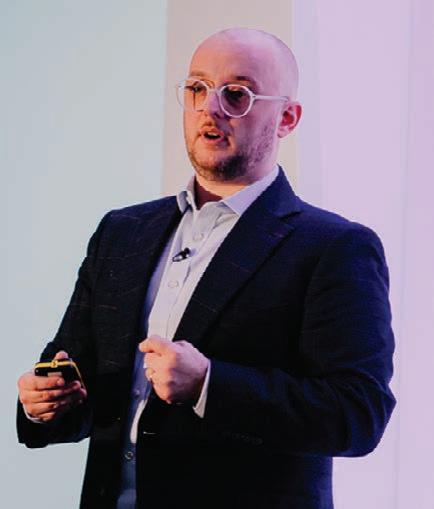
Businesses based in Derbyshire (excluding Bolsover), Nottingham and Leicester can apply for £2,000 of expert advice to adopt new technologies or processes.
The support is being offered as part of the Accelerator programme for businesses to tap into specialist training or consultancy if they can demonstrate that growth will be boosted.
The type of support in Derbyshire includes areas such as digital & AI, websites & e-commerce, finance, HR & employment law, marketing, sales and social media. In Nottingham and Leicester there is a particular focus on AI & digital and sustainability.
One company to benefit is Finney’s Wood Finishes, in Chesterfield. This husband-and-wife partnership supply stains, waxes and finishes for interior and exterior wood. They secured a growth voucher to cover the costs of 16 hours of funded digital consultancy advice from specialist Paul Ince.
Co-owner Sue Finney said: “Paul has been superb and really helped us with hands-on training as well as creating a marketing strategy document, which we are implementing. We definitely feel more in control of our business now as we have a strategic plan towards growth.
“This will enable us to reach more customers, to develop our offering by creating more educational content and so become more competitive. All our efforts are already seeing the business grow.”
Another company helped is Aim Strong Support, in Leicester, a family-run business providing

coaching and education in movement, sport and leadership. It received 20 hours of digital consultancy advice from specialist Martin Broadhurst.
Managing director Harry White said: “It’s hard to put a figure on it but the guidance and CRM system support has been incredible. I can now log and track all outreach work and monitor our pipeline. It’s helped to increase my productivity with various tasks including emails, quoting and social media.”
New Mills Market Hall is the brainchild of four lifelong friends who came together to restore the iconic but vacant Market Hall building in the Derbyshire town into a welcoming food and drink space. They received a growth voucher towards financial advice which gave them a much better understanding of the tax implications, how to separate risk between the business and the building itself, and how to put in place agreements to protect the four owners.
Co-owner Beth Eadie said: “It’s hard to measure precisely, as we implemented the consultancy at such an early stage, but in theory, accessing this support could have saved us many thousands in future fees and taxes.
“Our Chamber business adviser Steve Phillips was incredibly helpful in ensuring we accessed the right financial consultancy at the right time and has given us confidence we are more streamlined, financially resilient, and better prepared for growth.”
To register, contact our dedicated business support line on 0330 053 8639 or complete the registration form at: www.emc-dnl.co.uk/ services/accelerator


Senior decision-makers seeking to improve their leadership skills can apply for a £750 bursary to attend the Help to Grow: Management Course.


Nottingham businesses can seize a range of new support following thousands in government investment.
Embracing AI, cutting energy costs and getting greener are among topics in an extensive series of new support programmes for firms in Nottingham city.
Delivered by the Chamber on behalf of Nottingham City Council, the Nottingham Accelerator project runs until 31 March, 2026, with a comprehensive set of workshops now open for registration.
Having received £124,982 from the government through the UK Shared Prosperity Fund, the project strives to help firms grow, innovate, go more digital, decarbonise and reach sustainability goals.
‘Valuable insight and tangible impact to businesses in our city to help them thrive’
Digital transformation adviser David Dobson can provide tailored oneto-one advice for businesses looking to embrace technology or AI platforms, adapt to technology and processes that have been newly introduced or get sustainability support through free energy audits and decarbonisation webinars.
Nottingham city businesses can also apply for growth vouchers up to the value of £2,000 towards specialist consultancy or training, where they are looking to adopt new technologies, improve processes and become more sustainable.
Newly launched digital and AI programmes for autumn 2025 include:
• 22 October: Harnessing AI for Business
• 23 October: Microsoft 365 CoPilot for Business users
• 20 November: Utilising ChatGPT for your Business
• 10 December: Mastering Graphic Design with Canva and Adobe Express

“The Chamber and its partners can offer a diverse breadth of tailored digital and sustainability support through Nottingham Accelerator with tailored advice, consultancy and training.
“Our engaging programme will connect businesses with expertise in areas such as automation and robotics, technology to improve productivity and offer digital knowhow.”
Nottingham Councillor Linda Woodings, the executive member for regional development, growth and transport said: “We are delighted that East Midlands Chamber will be delivering dedicated support to businesses in the city of Nottingham through this funding, which will provide valuable insight and tangible impact to businesses in our city to help them thrive.”
Following engagement with firms, the Chamber will create an AI forum that will identify growth opportunities as firms progress through their digital journey.
To join the Nottingham Accelerator project go to https://bit.ly/4etxuBL or call the Chamber’s business support helpline on 0330 053 8639.
The course is designed for senior leaders and managers who want to build resilience, improve performance, and drive sustainable growth.
Delivered by the University of Derby, Nottingham Trent University and the University of Nottingham, this 12-week programme combines expert-led online sessions, face-toface workshops, one-to-one mentoring and practical peer support.
Participants will explore essential topics such as strategy & innovation; digital adoption; international growth; branding & marketing; finance & operations; and employee engagement.
More than 90% of participants would recommend the course to other business leaders, and many report tangible changes to the way
they manage and grow their organisations.
The bursary covers the 10% oneoff upfront fee, with the remaining 90% of the course cost funded by government.
To apply for this bursary, businesses must be registered for the High Growth or Export Accelerator projects.
COURSE START DATES:
• 10 November, University of Nottingham
• 26 November, Nottingham Trent University
• 5 January, University of Derby
The Accelerator project is funded by UK government through the UK Shared Prosperity Fund (UKSPF).
Limited spaces are available, and enquiries should go through helptogrow@emc-dnl.co.uk or by calling Chamber head of skills Vicki Thompson on 07469 148833.




By Scarlett Canavan (pictured), business & marketing manager of ER Recruitment, and chair of Generation Next.
The last stretch of the year is here, making it the perfect time to reflect on your goals and make the most of every opportunity to finish 2025 on a high.
Generation Next has a line-up of events over the last three months of the year to help you learn, connect and level up your career before 2026 gets under way.
Kicking things off for members on Tuesday 14 October is a useful olnline webinar for members called AI, Technology & Performance Enhancement. It will offer a chance to discover how AI can make your work smarter, faster and more impactful.
‘Generation Next is open to all Chamber members aged 18-35, and we’d love to see more faces involved’
From 7-10pm on Friday 31 October, you can join us in person for a spine-tingling Murder Mystery Evening at Derby Conference Centre.
Step back to the gardens of a country estate in 1901 for a fun way to sharpen your teamwork, critical thinking and communication skills, and work out who did it.
Tickets include a three-course dinner and arrival drink of either prosecco or beer.
November keeps the momentum going with Entrepreneurship & Idea Development – an hour-long, online course on the morning of 12 November. It will give practical tips on how to turn your ideas into reality and build and grow a successful business.
Generation Next officially wraps up its learning content for the year


on Thursday 4 December, with another online session looking at Innovation & Problem-Solving Skills.
It has been designed to help bring innovation into your daily work to help you stand out, solve challenges, and drive personal and professional growth.
For everyone looking to get into the festive spirit with like-minded professionals, we will be releasing more details about our Christmas social very soon.
Generation Next is open to all Chamber members aged 18-35, and we’d love to see more faces involved as we close out the year.
It’s the perfect way to reach your goals, make new connections so that you can hit the ground running in 2026.
With our popular conference coming up early next year and flagship awards in the pipeline for summer 26, now’s the time to get involved, meet like-minded professionals and finish the year strong.
For events details visit: https://generationnextemc.co.uk/ event/


The Chamber-run Generation Next networking group was created to give young executives access to the right support to help them thrive in their careers.
Among the benefits that come with membership are practical sessions designed to give participants transferable skills to use in their working lives.
There are also regular social events and inspirational guest speakers so that participants can learn from others, with the aim to improve their motivation, innovation and creativity. Likewise, peer-to-peer networking can help boost confidence, and gives the opportunity to develop the skills needed to build business relationships.
There is also an evolving library of resources to support learning and development and mentoring opportunities, giving the chance to connect with experienced business leaders for top-level coaching.
Last, but by no means least, is the annual Generation Next Awards which showcase the best of the best when it comes to young entrepreneurs in Leicestershire, Derbyshire and Nottinghamshire.
To find out about joining visit: https://generationnextemc.co.uk/








The winners of the 2025 East Midlands Chamber Enterprising Women Awards were being announced as Business Network went to press.
More than 300 people were set to attend the sell-out ceremony at the end of September at Winstanley House, on the outskirts of Leicester.
The Awards, sponsored by headline partner Michael Smith Switchgear, are a highlight of the calendar, recognising women from all industries and career stages –from rising apprentices and thriving teams, to pioneering entrepreneurs and lifetime achievers.
‘The winners truly embody everything the Awards stand for’
The night was hosted by Enterprising Women co-chairs Eileen Perry MBE and Jean Mountain with ITV presenter Emma Jesson handing out the Awards.
Eileen said: “The finalists this year were outstanding, and the winners truly embody everything the Awards stand for.”
Jean said the Awards celebrate the incredible achievements of women in business, and their stories were nothing short of inspirational.
The Lifetime Achievement Award, sponsored by Paradigm Wills & Legal Services, was this year presented to Sandra Wiggins.
Sandra is co-founder of DPI UK, an SME manufacturer of interior soft signage display frames and lightboxes. She was a finalist for the 2021 Enterprising Women Awards, in the Businesswoman of the Year category and her business was a finalist in the Chamber’s Leicestershire Business Awards in
2021. She is vice-chair of the East Midlands Manufacturing Network for Leicestershire and co-founded Women on Boards CIC, which has been instrumental in driving gender equity and inclusive governance, opening doors for women leaders across the UK and beyond.
Praising Sandra’s remarkable impact, Eileen said: “Sandra has been a trailblazer in every sense of the word. Her commitment to mentoring and supporting others, as well as her own exceptional achievements, means she has left a mark on our business community and is a shining example of what can be achieved with passion, integrity and resilience. Her journey is an inspiration to all of us, and it was a privilege to witness her win this Award.”
The 10 winners represent the very best of talent, innovation and commitment across the East Midlands.
De Montfort University took the spotlight with three nominations and two wins. Sarah Thompson, partnerships lead at DMU, took the Social Commitment Award, with judges impressed by her passion and energy for community impact. Dr Dyneshia Johnson was recognised for her ground-breaking work as an innovator in education.
Female Employee of the Year, sponsored by Cambridge & Counties Bank, was Alexandra Carr, who was recognised as an integral part of music licensing business PPL PRS, inspiring colleagues and women inside and outside the business.
Walking away with the Businesswoman of the Year Award – sponsored by Michael Smith Switchgear – was Mariam Smith, who judges said encompassed everything it takes to receive the honour.
Enterprising Women co-founder and Chamber board member Eileen Perry MBE DL has been nominated for the President’s Award at the annual British Chambers of Commerce 2025 Awards.
Eileen, who is the founder and director of ER Recruitment in Leicestershire and a former president of the Chamber, has been co-chair of the women’s networking group – which she helps oversee with Jean Mountain – for 28 years. She was appointed as a Deputy Lieutenant for



Team of the Year Award – sponsored by Breedon Consulting: CMP Legal
Apprentice of the Year Award – sponsored by Futures Housing Group: Hannah Livingstone, Rolls Royce
Developing Leader Award – sponsored by Sarah Higgins Corporate Coaching: Nicola Chambers, Dales Fabrications Limited
Female Entrepreneur of the Year – sponsored by Freeths: Emily Cardy, EC Manufacturing Group
The Innovator Award – sponsored by Pick Everard: Dr Dyneshia Johnson, De Montfort University
Businesswoman of the Year – sponsored by Michael Smith
Switchgear: Mariam Smith – Datalink Electronics
Employee of the Year Award – sponsored by Cambridge and Counties Bank: Alexandra Carr, PPL PRS
Small Business Award – sponsored by Unique Window Systems: Trans-Sport.TV
Social Commitment Award - sponsored by Generation Next: Sarah Thomson, De Montfort University
Lifetime Achievement Award – sponsored by Paradigm Wills: Sandra Wiggins
• Pictures from the night will be featured in the November edition of Business Network
Leicestershire in 2022 and received her MBE in 2018 for services to support businesses.
She is up against senior figures from chambers of commerce from as far afield as Barnsley, Cornwall, Korea and Dubai. The Awards take place on 15 October, 2025.
Last year’s President’s Award went to Chamber chair Kevin Harris.
Jodey Adams, East Midland’s Chamber’s data integrity & CRM manager, has been nominated for the 2025 Rising Star Award.


DERBYSHIRE:
17 October
Member presentation at Chamber headquarters, Chesterfield
https://is.gd/LUoKOe
NOTTINGHAMSHIRE:
28 October
NTU Mansfield
https://is.gd/6UpxJw
REGIONAL MEETING:
18 November
Annual general meeting at Toyota Derby
https://is.gd/hvWHXd




The Chamber launched the East Midlands Manufacturing Network (EMMN) in March 2022.
Today there are six groups running across Derby, Derbyshire, Leicester, Leicestershire, Nottingham and Nottinghamshire, which meet every couple of months throughout the year.
Between them, the branches have 400 members, including companies such as Derby medical product manufacturer Pennine Healthcare, Castle Donington moulding and woodworking specialist Gordon Ellis and Co and Derby drill and cutting tool maker MA Ford Europe.
A new branch was created last year covering the county of Leicestershire and based in
Midland Lead has supplied recycled lead to customers all over the world for more than 40 years. Its manufacturing plant in Swadlincote, Derbyshire, combines global scale with a family-run culture which puts customers and team at the heart of everything it does.
The business has around 50 employees, and has won several awards for people development, including being named regional winners of the People and Work Business of the Year category at the British Chambers of Commerce Awards.
‘EMMN provides an important forum for discussing challenges that many manufacturers face’
The company is dedicated to sustainable manufacturing and prioritising its environmental responsibilities. In fact, Team Midland Lead were honoured to be recognised with a King’s Award for Sustainability in 2024.
Owners Francoise Derksen and Boudewijn Tuinenburg joined the network as they were keen to connect with other manufacturers in the region to discuss common opportunities and challenges.
Boudewijn said: “We’re a progressive company with a history of continuous improvement and are proud of the impact we’ve made with staff development and sustainability. But we know there’s always more we can do and more we can learn.
“In addition to best practice sharing, EMMN provides an

Loughborough – an important historical centre for manufacturing as well as further and higher education.
Membership is free and open to manufacturers of any size. It also entitles members to complimentary membership of Make UK.
The criteria for joining the network are:
• You are a senior manager or leader
• Your business is based in the Chamber area of Derbyshire, Leicestershire and Nottinghamshire
• Your business makes something
https://emmn.co.uk/

important forum for discussing challenges that many manufacturers face – things like skills shortages, production efficiencies and increasing energy costs.”
Francoise and Boudewijn joined EMMN in 2023 and have actively engaged in forums and meetings to connect with other like-minded manufacturers.
At an EMMN bi-monthly breakfast meeting in 2024, Francoise presented the HR journey that led to Midland Lead being accredited as an ‘Employer of Choice’.
Midland Lead has also collaborated with fellow members Kompelec, which offered valuable support on electrical maintenance,


and Devtank, which shared its expertise in energy monitoring.
Learning more about lean manufacturing is also an ongoing priority for Midland Lead, and EMMN enabled a useful discussion with member Aquabox on this topic.
Francoise, along with colleague Charlotte Summers, has also been following the Lean Manufacturing Programme from East Midlands Chamber after learning about it via EMMN.
Beyond EMMN meetings, Midland Lead has engaged with a range of Chamber-led initiatives and events to support their growth and innovation goals including taking part in workshops and attending conferences.





Sharing best practice, overcoming hurdles and seizing the benefits of net zero, sustainability and governance goals were among areas addressed by business leaders and academics at the East Midlands Sustainability and CSR Conference 2025.
The Chamber delivered the annual event in partnership with (and hosted by) the University of Derby. It was sponsored by Epson UK, Blueprint, Flogas (part of DCC Energy) and Geo Green Power, and brought businesses and researchers together to share insight and experiences in the context of the current economic and political climate.
Chamber director of policy and insight Richard Blackmore chaired panel discussions on community support. He said: “Getting firms from across the East Midlands together in a place where the very latest research can be presented, where businesses can share what’s going well in their own journey toward becoming more sustainable and embracing CSR, but also hearing of the challenges they’ve faced is invaluable.
“While firms are progressing on that path, the conference proved there are important conversations to be had to get the approach right so that it does not just tick a box but brings significant benefit to a business.”
University of Derby associate professor of strategy and sustainability Dr Polina Baranova shared findings from its latest research –produced in partnership with the Chamber – into Green Growth Trends, which is now in its 10th year and will be published soon.
She said: “What we're seeing generally is that businesses are increasingly trading in green goods and services so the market for green goods and services is developing well. When


‘The conference proved there are important conversations to be had to get the approach right’
there is more competition, more engagement from businesses, consumers buy products and carbon reduction is applied, that is a positive sign.”
Sustainability and building health consultant Becky Valentine, who co-owns Spenbeck, gave a talk on approaches to effective governance.
She said: “This conference has been hugely important. We hear of the lack of perceived collaboration opportunities – addressing that is what it's all about at a conference like this, bringing data into the room, bringing the concerns of businesses into the room, bringing everybody together to actually move forward in a meaningful, purposeful way, rather than doing it in a silo.”
Geo Green Power managing director James Cunningham, who gave a talk on resilience and
growth through engagement with CSR and sustainability, said: “It's amazing to get lots of people with the same frame of mind in a room, who are feeling positive about ESG [environmental, social and governance] and know that this is a very real issue we face in climate change.”
Jasvinder Aujla is strategic energy partner at Flogas (which is part of DCC Energy). She gave a talk on overcoming challenges in reaching sustainability and CSR goals.
She said: “The work that is being done by companies around nature-based solutions, for example, was eye-opening. There's a lot to learn from events like this.”
Samworth Brothers community engagement lead Karen Holdsworth took part in a discussion on the role of community support.
Afterwards she said: “For more and more people coming in as a potential recruit, questions often asked are ‘what is your volunteering policy?”, “Can I get involved in volunteering?”, “Do you partner with any charities?”.
“It’s really important and perhaps more important than ever because charities are struggling. It's time for businesses to step in and it doesn't have to be a monetary donation. Contribution can be time, can be a product or can be skills.”
Epson UK corporate sustainability manager Taranpreet Rai, who shared insight from Epson UK’s approach to environmental sustainability and community engagement, said: “Having likeminded people at the conference to talk about things that are going wrong or right for them is helpful. That's something not spoken about enough – things going wrong. It means you can find solutions.”



Tickets are on sale for East Midlands Chamber president Dawn Whitemore’s 2025 Celebration of Success and Annual Dinner, taking place at The Renaissance at Kelham Hall, in Nottinghamshire, on Thursday, 9 October.
Guest speaker is Dr Jo Salter MBE, who was Britain’s first female jet fighter and someone who was voted one of the BBC’s 50 most inspiring women in the world.
Headline sponsor of the celebration is Ineedbroadband, while East Midlands Airport is the speaker sponsor and Browne Jacobson the drinks sponsor.
Airport head of corporate affairs Ioan Reed-Aspley said: “We’re delighted to be one of the Chamber President’s Celebration sponsors this year.
“As the UK’s number one air freight hub, we are proud to play a pivotal role in the success of countless regional businesses – as well as being the gateway for millions of local people heading to their well-earned holidays.
“As the first female fast jet pilot, Dr Jo Salter has achieved remarkable things and we hope local young people will be similarly inspired to take up careers in aviation to take us and the region forward to greater success.”
In a joint statement, Kay Chand, Robert Wofinden and Ian Long – partners and Nottingham office co-heads at Browne Jacobson – said: “The roots of our firm, founded almost two centuries ago in 1832, are firmly in Nottingham.
“This region has provided fertile foundations to grow into a truly national law firm that is now fully entrenched within the UK’s top 50 and actively targeting international expansion, having launched in Dublin three years ago.
“While we now have seven UK and Ireland offices, our commitment to our East Midlands heritage is unmoving. A significant proportion of our 1,300 people are based in the heart of Nottingham, while we act for some of the region’s largest organisations across the public and private sectors.
“Much of our award-winning work to enhance diversity, equality and inclusion (DEI) within the legal profession – in particular, promoting social mobility and supporting young Black lawyers into careers in law – also takes place in the East Midlands, demonstrating our dedication to nurturing the region’s top up-and-coming talent.
“East Midlands Chamber provides a fantastic network for firms like ours to celebrate these initiatives, learn from each other and forge new connections within the local business community.
“As a firm that acts as a ‘connector’ between our clients, Chamber membership and events like the Autumn President’s celebration are invaluable opportunities to solidify and create new relationships. We’re excited to support this event and look forward to meeting old and new faces.”
To attend the President’s Celebration of Success, visit: https://is.gd/JP4LPD
HIGH GROWTH ACADEMY: GROWTH DRIVERS
• 9 October: Unlocking Hidden Growth, University of Derby
• 15 October: Access to Finance, University of Nottingham
• 5 November: Marketing, University of Derby
HIGH GROWTH ACADEMY: GROWTH BUILDERS
• 7 October: Your Personal Leadership DNA, Nottingham Trent University
• 13 October: Leadership Team Dynamics, University of Nottingham
• 10 November: Coaching for High Performance, Nottingham Trent University
• 19 November: Leadership Team Dynamics, University of Nottingham
Book your place at: https://bit.ly/AcceleratorTrainingEv
View all events www.emc-dnl.co.uk/events
Businesses in Derbyshire and Nottinghamshire can sign up to a programme of events and workshops offering tailored academic and business support.
The new High Growth Academy aims to equip scaling businesses with the skills, knowledge and resources they need to innovate and grow sustainably.
It is delivered by the Chamber on behalf of the East Midlands Combined County Authority (EMCCA), in partnership with the University of Derby, University of Nottingham and Nottingham Trent University.
The Academy is part of the wider High Growth Accelerator project that has received £450,352 from the UK government through the UK Shared Prosperity Fund (UKSPF), and is open to businesses that can demonstrate 20% annual growth in revenue, employment or market share over the past three consecutive years.
High Growth Academy support includes: workshops reflecting the needs of businesses at different stages of their growth journeys; ‘Growth Driver’ sessions for new businesses covering subjects such as sales, leadership and emerging markets; ‘Growth Builders’ for senior leaders in established businesses, on subjects such as governance, structure and performance management.
‘Whether
your business is starting or scaling, this could be the programme for you’

There are also monthly High Growth forums offering businesses support, a chance to hear from industry experts and share insight with peers.
Additional help, through the wider High Growth Accelerator project, includes: one-to-one support from an advisor; innovation vouchers of up to £5,000; student placement support of up to £2,000; training bursaries of up to £2,000 to attend one of the Chamber’s commercial training courses, including its Director and Manager Development Programmes
Chamber deputy chief executive Diane Beresford said: “Whether a business is seeking to drive innovation, improve how it manages its finances, adapt its structures or coach its leaders and emerging leaders in high performance, we have the expertise and resources to turn ideas into real action.”
Mayor of the East Midlands Claire Ward (pictured) said: “Businesses across the East Midlands have boundless potential for growth, but those same businesses tell me every day just how few hours in the day there are to think and plan for this.
“The High Growth Academy makes that space, drawing on the East Midlands Combined County Authority’s UKSPF funding but also expertise from business and academia.
“So, whether your business is starting or scaling, this could be the programme for you.”
Register at https://is.gd/bRNRxp Book workshops at: https://is.gd/LehlpV
Find out about the Chamber’s commercial training courses, and potential £2,000 subsidies, at: https://is.gd/ENaHY7



Ageneticist working with ape specialists at Twycross Zoo has developed a test which could help save highly vulnerable gibbons from extinction.
Almost all 20 species of gibbon are either endangered or critically endangered, threatened by habitat loss and the exotic pet trade.
Despite captive breeding programmes, it is hard to tell some species apart, with unknown hybrids unable to be released into the wild.
University of Leicester geneticist Dr Lauren Lansdowne – supervised by Dr Richard Badge –
has developed a genetic test to reliably determine the species of an individual gibbon.
Dr Lansdowne worked with researchers at Twycross, the University of Tokyo and 19 other zoos across Europe to create samples from more than 200 gibbons to work with.
Her simple genetic test was able to confirm the species of gibbons in European zoos, and identified some that could have hybrid ancestry.
Dr Lansdowne, who spent three months on placement as part of her

Natural England has worked with Derbyshire Wildlife Trust, Staffordshire Wildlife Trust, the National Trust and Chatsworth Estate on a £5m project to plant 84,000 native trees across the Peak District Dales to combat ash dieback disease.
The five-year LIFE in the Ravines project has restored up to a quarter of the area’s most severely damaged woodlands, creating resilient habitats that will protect the rare ecosystem for years to come.
Ash dieback has devastated ancient woodlands in the Peak District Dales Special Area of Conservation, and the project has replanted a mix of species, including largeleaved lime, small-leaved lime, and wych elm trees that thrive in limestone ravines.

PhD at Twycross, said: “Although captive breeding programmes ensure populations are maintained away from the threats in the wild, it is vital that these populations are healthy.
“This test provides an easy way for zoos and rescue centres to assess their gibbon populations, providing important information to help guide future breeding, release, and welfare decisions.”

University
Leicester
The team at Abacus Flooring Solutions invited clients, friends and civic leaders to celebrate achieving their 2025 King’s Award for Enterprise in Innovation – one of the UK’s most prestigious business honours.
The award was presented by Leicestershire Lord-Lieutenant Mike Kapur OBE during the celebration at Whatton House, near Loughborough.
It was given in recognition of the company’s sustainable flooring innovation Abaplas – a resin system using 100% recycled plastic.
Guests were welcomed by Abacus’ branded fleet before enjoying afternoon tea and hearing about the Loughborough company’s journey so far and plans for the future.
They included Deputy Lord Lieutenant Ian Borley and business leaders including Leanne Bonner-Cooke MBE, Dr Nik Kotecha OBE and Eileen Perry MBE DL, as well as representatives of clients including Reckitt and Twycross Zoo.
Founder and director Nick Megson said: “From the start, our mission was to do things better –for the industry, the environment, and our clients. This award is for the whole team – every






SF Recruitment chief executive Saira Demmer (left) and Lisa Drumm, who leads the firm’s Frankfurt office
SF Recruitment has opened its first international office in Frankfurt, focussing on finance and accountancy recruitment, supporting businesses and professionals across Germany’s Rhein-Main region.
The launch follows a series of successes for SF Recruitment. In 2024, it was recognised in The Sunday Times Best Places to Work list, won recruitment agency of the year at the Recruiter Awards, and chief executive Saira Demmer was named on Management Today’s women in leadership power list for 2025.
It has a growing presence and hubs including Manchester, Birmingham, London and the East Midlands, and has also recently made new sector expansions and seen an increase in international client demand.
Leading the Frankfurt office is business manager Lisa Drumm, who has expertise in finance appointments across accounting, controlling, tax, M&A and treasury.
For UK businesses, the Frankfurt office creates a direct route to cross-border recruitment support, helping them expand into new markets.
Saira said: “Our expansion into Germany marks the start of a new and exciting phase for SF Recruitment.
“For more than 26 years, we have been dedicated to putting people into jobs they love and supporting businesses with the talent they need to succeed.
“Frankfurt is one of Europe’s most dynamic financial centres, and with Lisa’s expertise on the ground we are in a strong position to deliver long-term, sustainable recruitment solutions for both clients and candidates.”




Managers and owners of businesses involved in the import and export of goods and services – or those considering branching out into them – are being encouraged to consider the Chamber’s wide range of international courses and support offerings.
The Chamber has a long-established international team covering everything from document support to helping exporters and importers understand the new India free trade agreement. Other services include helping with the process by supplying ATA Carnets.
They are the documents needed to move expensive bits of kit and equipment – such as hospitality equipment, catering gear or multimedia gear – out of the UK for short periods for things such as trade shows and corporate events, and back again.
‘Your opportunity to gain practical insights, make valuable connections’
The document helps streamline the customs process by offering a dedicated declaration form with a predetermined cost.
Lucy Granger is international trade manager at East Midlands Chamber, which has been issuing carnets for well over a decade, which means her team is expert in all the practicalities.
The number being processed has grown since the UK left the EU – for the simple reason that they weren’t needed for travel into and out of Europe when we still held membership.
A new service for businesses in Nottinghamshire, Nottingham, Derbyshire or Derby looking to import, export or expand internationally is the Chamber’s International Trade Forum – free sessions designed to help businesses trade smarter and more confidently on the global stage.
The regular forums include expert talks on compliance, regulation, free trade agreements and cultural awareness; round table discussions to tackle real-world trade challenges; networking with traders, advisors, and support providers; and access to best practice tools and resources to fuel global growth.
They are aimed at SMEs starting to import or export for the first time; established exporters/importers navigating new markets or regulatory change; manufacturers, retailers, and e-commerce businesses with cross-border operations; and business development teams looking to expand overseas.
Lucy Granger said: “Whether you're just starting out or scaling international operations, this forum is your opportunity to gain practical insights, make valuable connections, and strengthen your global trade strategy.”
Businesses might also want to consider bespoke training for their international trade operations. That could involve dedicated delivery of the Chamber’s flagship programme, the International Trade Operations and Procedures (ITOPS) course, or providing export documentation training specific to a company's processes.
To discuss your organisation's bespoke international training requirements or find out more about ITOPS, contact Julie Whiting at: julie.whiting@emc-dnl.co.uk
To find out more about the International Trade Forums, visit the Chamber website or contact Lucy Granger at: Lucy.Granger@emc-dnl.co.uk
• Trading with the Ireland of Ireland 9am-12.30pm, 7 October, £185-£247
• Dangerous Goods by Road and Sea 9am-4.40pm, 7, 8, 9 October, £650-£780
• Understanding Origin in International Trade 9.30am-11am, 9 October, free
• Import Procedures 9.30am-3.30pm, 14 October, £320-£450
• Export Documentation 9am-4pm, 21 October, £320-£450
• Understanding Commodity Coding 9am-12.30pm, 4 November, £185-£247
Visit: www.emc-dnl.co.uk/events


Steve Griffiths (pictured), managing director of East Midlands Airport, explains how its growing cargo operation is helping to drive a surge in regional exports.
Airports have a crucial role to play in the economic fortunes not just of the regions they immediately serve, but more widely as major contributors to the UK economy.
This is borne out by statistics showing that more than half of Midlands exporters grew sales in the second quarter of this financial year, with East Midlands firms the second strongest for entering new markets in this period.
The UK Trade Barometer, developed by our parent company MAG and The Growing Together Alliance of business groups, also found that 45% of exporters to the US forecast growth in the next quarter and that sales to China are set to surge in the next three months.
As the UK’s number one express air freight hub, East Midlands Airport punches well above its weight in supporting global trade. Recent figures show that growth in our cargo volumes outpaced Heathrow, with more than 100,000 tonnes handled at East Midlands between May and July which is 17.4% up on the same period last year.
This contrasts with industry data that indicates that volumes of cargo carried in the ‘belly’ of passenger aircraft – the majority of Heathrow’s cargo – have remained largely flat year-on-year. This speaks to one of East Midlands Airport’s unique selling points. Our unrivalled cargo operation deals solely in cargoonly aircraft, which operate in and out of the airport largely at night.
These factors, and the ease and efficiency of our operation, provide certainty for freight carriers that their goods won’t be delayed at the airport while passenger flights take priority.
Added to this, our strategic central location, right next to the M1, offers access to 90% of the UK population within four hours.
One cargo airline which moved its operations from Heathrow to East Midlands a year ago, One
Air, tells us that it’s quicker to get goods offloaded from East Midlands to its warehouse near Heathrow than when it flew into Heathrow.
All these things have attracted major logistics firms like DHL, UPS and FEDEX to base their UK operations here, and contributed to us landing deals with four new cargo airlines since May and the subsequent growth in cargo volumes.
As an island trading nation, the UK relies on strong connectivity to all key markets of the world.
‘Our strategic central location, right next to the M1, offers access to 90% of the UK population within four hours’

Across the Midlands, 51% of exporters increased sales to existing markets, while 29% entered a new market. America topped that chart, followed by Ireland, Poland and China. There was an increase in businesses saying they expect to grow sales to China, those saying they had grown sales to China as an existing market, as well as businesses entering China for the first time.
The four new airlines starting operations at East Midlands are all flying routes to and from China, while One Air, which also already operates to China, is starting scheduled services from Hong Kong, and so East Midlands is well-placed to support this trend. To respond to this extra cargo activity, we reconfigured our aprons to increase the number of cargo stands that take wide-bodied aircraft.

We know businesses trading internationally want to get their goods in and out of the country seamlessly, and East Midlands Airport has long played a vital role, forming the backbone of express freight that powers the growth of advanced manufacturing and other high-value industries. Around half are firms based in the region which rely on the airport to make their business work.
This is reflected in the findings of The UK Trade Barometer, which surveys more than 2,000 businesses about their export performance over the previous three months and their expectations for the quarter ahead.
The latest survey shows that East Midlands firms grew their global footprint in the second quarter of the financial year, with 58% entering a new market for the first time. That compared with 46% in the West Midlands. Only the north west was higher, at 68%.
We also have a longer-term cargo growth vision, with four runway-side plots available for redevelopment. That will include 1.3 million sq ft of warehouse space, new taxiways and stands for up to 18 more aircraft.
The plans anticipate a 54% growth in express freight cargo volumes over the next 20 years and could support more than 20,000 new jobs and an uplift of almost £4bn for the economy.
Two of those sites have freeport tax status, while a third that we own south of the airport is earmarked for a new logistics and advanced manufacturing park developed by global logistics property giant Prologis. It’s estimated this will help unlock £1bn of investment.
Developments like this close to the airport, and the strength of our cargo operation, underline the importance of aviation as a key enabler for the Government’s new industrial and trade strategies, and as a source of jobs and wider economic activity.

Business leaders were given a chance to ask three key political leaders about the devolution plans for Leicester and Leicestershire at an event organised by Leicestershire Business Voice and supported by the Chamber.
Leicester City mayor Sir Peter Soulsby, county council leader Councillor Dan Harrison and Melton District Council leader Councillor Pip Allnatt – the latter speaking on behalf of Leicestershire’s borough and district councils – outlined their vision for the devolution timeline and its benefits, as well as the hurdles they face getting there, while hearing from business leaders. The event took place at MIRA Technology Park.
When plans for the East Midlands Combined County Authority (EMMCA) were being drawn up a few years ago, Leicester and Leicestershire decided not to be part of it. EMMCA was launched last year with its own elected mayor, which some say has given it an advantage when it comes to Whitehall investment.
The councils of Leicester and Leicestershire, possibly with Rutland, are now in discussions about creating a new tier of local government with an elected mayor and devolved powers like EMMCA. It would be responsible for things such as transport, skills and adult education, housing and land, net zero and economic development.
At the same time, the city, county, districts, boroughs and Rutland are also trying to find consensus on local government reorganisation (a separate issue to devolution) which could see them brought together to make two or three new councils.
Chamber chair Kevin Harris, who took part in a panel discussion on what businesses in the region need from devolution, said afterwards: “If we go back a few years, we saw great things happening in Leicester – enterprise zones, the freeport – a movement where Leicester became prominent and well respected; certainly, outside of Westminster.
‘Devolution is one of the biggest opportunities the East Midlands region has’
“Now we’re behind, in terms of funding that's coming into the region and funding in the future, and I think the city is also regarded at a different level by the powers that be, in the ability to find solutions to problems.
“The politicians need to come up with a simple solution to put forward to Government, which allows us to move forward. We’re already behind – we can’t afford to get further behind.”
Chamber board member and 1284 Communications managing director George Oliver chaired the panel discussion.
He said: “Devolution is one of the biggest opportunities the East Midlands region has and it’s really important and valuable that the three political leaders got together at this event to talk it through and answer questions. That’s so important, as devolution hasn’t received as much profile or coverage as local government reorganisation, generally.
“One subject that came up in the panel discussion was the importance of skills, funding and infrastructure. We can see, in neighbouring authorities, the amount of central funding that's coming through.
“Without a mechanism to pull that in, Leicestershire is potentially losing out, so devolution is essential to make Leicestershire competitive. That’s not just on a UK level, but on an international level as well.
“It’s important to ensure all the great things Leicestershire has have been recognised by Government, built up and are treated as investment opportunities.”
Ian McKenzie, chief operating officer of wealth management specialist Mattioli Woods, said: “What the event did was position business front and centre, so politicians could hear what our
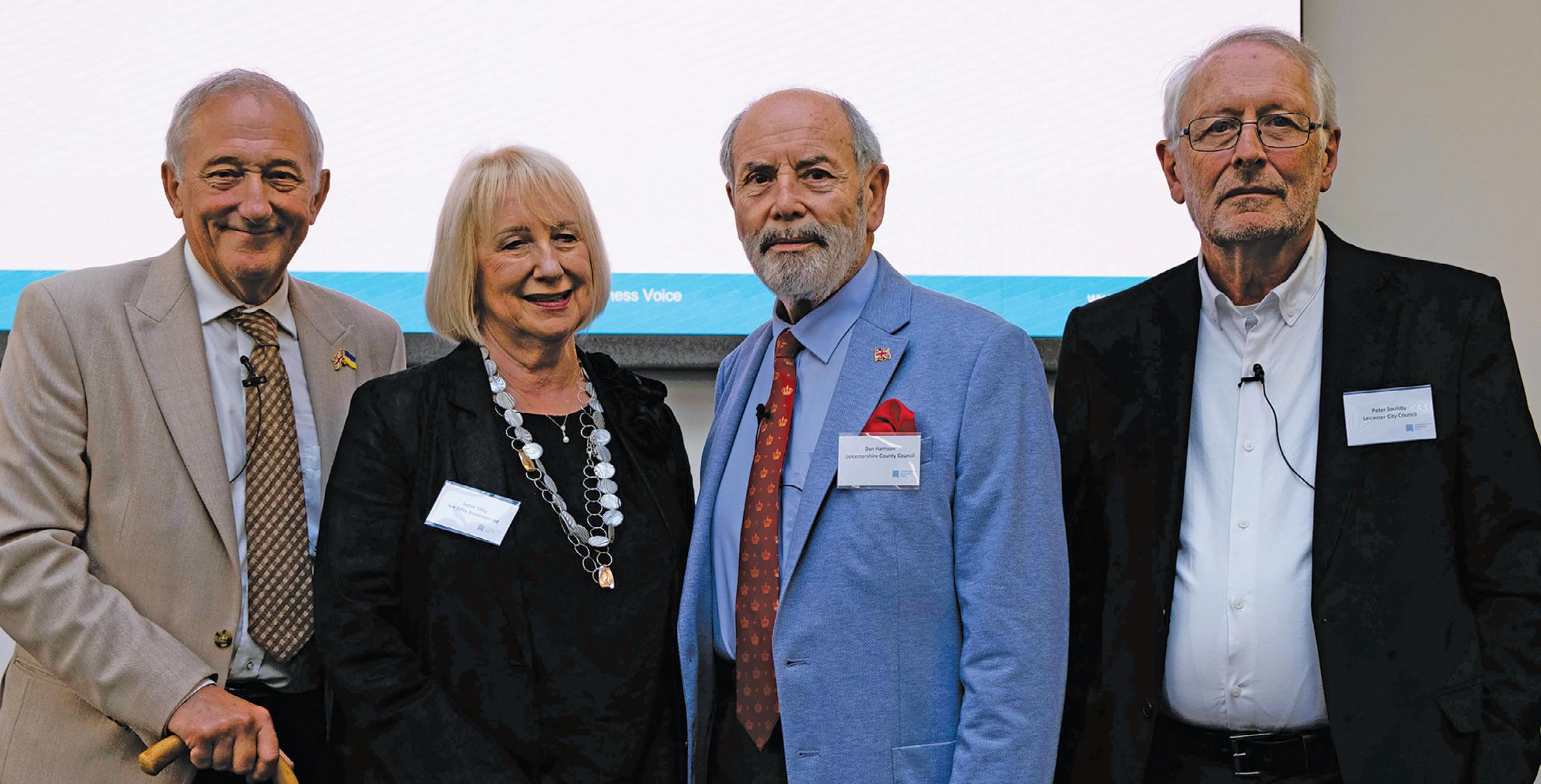





concerns are, what our needs are. Businesses need to be more involved in these types of conversations, rather than just being guided by politics without the wider consideration for what we need.
“It was very clear that the three political representatives didn’t agree on what the solution on devolution should be. I think that will cause problems when the Government come along and say, “this is what’s happening”. We’re then going to be acting reactively to the situation, rather than being proactive and getting forward with what we can do.”
MIRA Technology Park head of cluster development Sarah Windrum said: “The fact three political leaders were present and prepared to answer questions from businesses is a huge leap forward. It's important they recognise we are part of this strategic conversation.
“We need to see more alignment between them as regional authorities and bring the business voice into that strategic conversation more frequently, as a greater part of that conversation.”
Structural Adhesives managing director Angela Orton, who joined the panel discussion, said afterwards: “We need a harmonious plan that will give us stability.
“Businesses are grappling with so many things at the moment, like where funding is coming from so we can grow, we can innovate, we can do the things we need to do; never mind dealing with infrastructure problems and how staff get to and from work easily.
“We need to work out how we develop skills

so we can go into our business community, employ locally and grow locally. We need to look at the greater good – the people and the businesses of Leicester and Leicestershire.”
Cllr Pip Allnatt said: “The Government’s timetable is clear and the work that’s got to be done is to make the formal application in November. We all agree on what the footprint should be for devolution but what we need to do, as a team, to make that bid credible, is to demonstrate the commitment of business to devolution and its desire to get on with the job, to accelerate the process.”
Cllr Dan Harrison said: “Business leaders are our future, so the meeting was important. They're the people that drive employment, energy and the machine forward. We need more people in work and to see businesses expand.”
Chamber chief executive Scott Knowles said it will continue to campaign strongly for devolution in Leicester and Leicestershire, making the case for a combined authority to be established, as quickly as possible, to deliver decision-making that reflects the needs of businesses and communities.
He said: “By championing a clear, unified voice, the Chamber will press for the investment and resources needed to unlock economic growth, support innovation, and drive productivity across the region.
“This focus on devolved powers will help ensure that Leicester and Leicestershire can compete more effectively for investment, both at home and overseas to attract new opportunities, and create long-term prosperity.”
Nottingham City Council’s latest budget report suggests its financial position is improving, with a forecasted underspend of £3m this financial year.
The latest report follows what the council said was a “better-than-expected budget outturn” for the 24/25 financial year which meant it needed to use only £7.7m of the £41m of Exceptional Financial Support the Government had allowed it to meet its funding gap.
But the report said it was still early in the 25/26 financial year and various factors could still change the financial position.
The council hopes to achieve £27.9m out of £39.1m in targeted savings which means the budget relies on mitigations including more
than £10m of savings from “staffing vacancies”.
Councillor Ethan Radford, the council’s deputy leader and executive member for finance and resources, said: “The report shows an overall forecast underspend of £3m in period three.
“This shows that the city’s quarter one financial performance was positive, and the overall financial position of the council is moving in the right direction, away from Exceptional Financial Support.
“We are seeing the results of a more accurate approach to forecasting and a more robust approach to delivering agreed savings, with fewer agreed savings at risk of nondelivery, which is an indication of health in the council’s finances.”
A growth plan to transform the lives of people across Derby, Derbyshire, Nottingham and Nottinghamshire has been unveiled.
Mayor of the East Midlands Claire Ward and the Royal Society for Arts, Manufactures and Commerce spent months drawing up the Inclusive Growth Commission report, with recommendations for making the region a better place to live and work.
The report brings together new ideas for skills, health, housing and transport – to help people across Derby, Derbyshire, Nottingham and Nottinghamshire access good jobs, better opportunities, and develop stronger communities.
The report suggests the region could attract £200bn of investment by 2035 and that supporting the 18 most promising new industrial sites could help 30,000 low-paid workers earn around £6,700 more each year.
‘Too many young people face broken steps on the journey to a secure job’
Helping people build stronger networks and connections could add £1.4bn in extra income for the poorest households over the next 10 years – while cutting worker health problems could save up to £10bn a year.
Claire Ward said it was the first regional model of its kind in the UK.
She said: “The East Midlands is a region of huge pride and ambition. We’ve always been a place that builds, creates and leads, from our world-class manufacturers to our thriving new industries in green energy, life sciences and the creative economy.
“However, too often the opportunities our people deserve aren’t spread fairly. That’s why I asked the Inclusive Growth Commission to look hard at the barriers and the solutions.
“The commission’s final report makes clear the challenge is not aspiration as we have that in abundance, but the pathways that turn ambition into achievement.
“Too many young people face broken steps on the journey to a secure job, a decent home or affordable transport.”




Digitisation projects can feel daunting. They promise greater efficiency, lower costs and better insight into your business, but they also bring risk. So where do you start?
Success isn’t just about choosing the right software, it’s about how you plan, structure and manage the process. If you get it wrong you risk wasted investment, frustrated staff and no real progress, but get it right and your business moves faster and smarter.
Every project needs a clear purpose. Ask yourself: what do we actually want to achieve? Freeing up staff time? Saving money? Improving accuracy? The goal should remain fixed, but the path to achieving it must stay flexible.
For example, if the objective is saving staff time, you may not need a complex reporting system at first. Automating small, repetitive tasks could deliver quicker wins and free up capacity immediately.
AVOID SCOPE CREEP WITH CLEAR BOUNDARIES
Scope creep is one of the biggest causes of budget overruns and missed deadlines. At the outset, define three lists:
1. Must-haves – the basic functions the system absolutely needs.
2. Nice-to-haves – useful features that can come later.
3. Distractions – ideas that sound exciting but will add time and complexity without supporting the core goal.
Being disciplined with these boundaries keeps everyone focused and prevents unnecessary costs.
ALLOCATE TIME AND RESOURCES REALISTICALLY
Digitisation projects require dedicated effort. If your staff are already stretched, they won’t magically find extra hours. You’ll need to either:
• Bring in short-term support to free up internal resources, or
• Accept that certain tasks will need to be deprioritised for a while.

No one has infinite time. Make sure you plan which activities can pause, so the project doesn’t stall due to competing priorities.
VS. BESPOKE VS. ADAPTED
One of the biggest choices you’ll face is which kind of software to use:
• Off-the-shelf tools are widely used, supported, and usually cost-effective – but they may not fit every need.
• Bespoke systems can be built exactly for you but tend to be expensive and harder to maintain.
• Adaptive platforms offer a middle ground: a robust, existing system that can be configured to your needs. You benefit from stability, support and flexibility at a much lower cost.
For many SMEs, this hybrid option delivers the best of both worlds.
Another key decision is how far to take automation. Ask “What tasks can we automate reliably today?”.
Routine admin tasks, order placement, stock control and invoicing are often the easiest starting points. As confidence grows, you can layer in intelligence, like smart scheduling tools that recommend optimal choices based on data. This phased approach reduces risk and helps staff adapt gradually.
A successful digitisation project isn’t about buying the fanciest software, it’s about clarity, discipline and pragmatism. Know your end goal, draw the boundaries, resource the project properly, and choose the right balance of off-the-shelf stability with tailored flexibility. Start simple and scale intelligently. Do this, and digitisation won’t just change your systems, it will transform how your business runs.

By Rebecca Warwick (pictured), founder of PruneSoftware
‘Automating small, repetitive tasks could deliver quicker wins and free up capacity immediately’


You hear the words ‘business innovation’ and you might think of big businesses adopting new technologies like AI or automation. But small businesses can be innovative too. Business Network takes a look at how you can access new opportunities for growth.
A lot of problems can be solved by simply asking “what if?”.
As a business owner, it’s up to you to foster a culture of curiosity and encourage your staff to think outside the box.
They might be teeming with ideas for a new product or ways to improve your current services, but if you don’t give them an opportunity to share, those ideas might never be heard.
You can create a safe space where they can pitch their ideas, experiment, and even fail – when it comes to innovation, we can learn just as much from our failures as we can our successes.
You’ve heard from your team, now it’s time to ask your customers.
As they are the ones buying and directly engaging with your product or service, they will be able to tell you exactly what they like – and don’t like – about it.
Ask for feedback, whether through surveys or direct conversations, and pay close attention to reviews and complaints. This way, you’ll be able to uncover valuable insights that guide product tweaks – or inspire an entirely new offering instead.
If you think innovation is a one-off event, think again. In order to truly maximise growth opportunities, you should regularly set aside time and resources to explore new ideas, examine the market and see what your competitors are up to. This doesn’t have to be an everyday activity, but your team should know that your door is always open to hear new ideas.
As your business grows, staying innovative may mean rethinking your initial approach. You might discover opportunities to adapt to new trends, diversify your offerings or even refine and amend your business structure, all of which can help you reach new customers.
For example, could you shift your focus to a more sustainable product line? Or could you explore e-commerce and reach a wider audience? Don’t sit still but stay agile and respond to what your customers what and need. This will help keep your business competitive in fast-changing markets.
Digital tools aren’t just for big businesses – they can be instrumental in helping small firms scale up. Accounting software, customer management systems and data analytics can streamline your operations, save you time and money and help you make informed decisions.
The best part? Many of these tools are scalable, allowing you to start small and expand as needed.
‘As a business owner, it’s up to you foster a culture of curiosity and encourage your staff to think outside the box’




This month’s Focus looks at the topical issue of ENERGY – its production, cost and the ongoing battle to make it clean, renewable and efficient. It ties in with the Chamber’s 2025 East Midlands Energy Conference, which takes place at Sir Richard Arkwright’s Masson Mills, home of Derwent Hydroelectric Power, in Matlock Bath, Derbyshire, on 3 December.






The Chamber’s 2025 East Midlands Energy Conference will have a packed diary of presentations and discussions exploring how businesses, academia and policy-makers can come together to ensure that clean growth underpins our future economic landscape.
How we approach energy production, its storage and infrastructure in the Midlands has a profound impact on the cost of doing business and the ability to decarbonise – and the conference will explore the strengths of the region and the role of the business community in that space.
The day will start by exploring what the future of energy production and storage could look like, then detail the range of projects currently underway, unpicking the challenges and the opportunities for the business community in the region.
The free event, which is open to Chamber members and non-members, is being held in partnership with the University of Nottingham Energy Institute.
The institute brings together energy research across disciplines, drawing on expertise from the university’s faculties of engineering, science and social science.
Last year the university signed up to a new collaborative network, dedicated to developing business support for climate start-ups. The Climate Scaling Collaborative is a pioneering

initiative to support IP-rich start-ups and spinouts with links to universities, working on solutions for climate mitigation and adaptation.
Backed by £5m from the Research England Development Fund, the initiative unites Imperial College, Cranfield University, the University of Derby, the University of Exeter, the University of Leeds and the University of Nottingham to provide support.
‘The Midlands has all the components to lead the development of future energy provision, storage and distribution’
The Energy Summit is sponsored by Flogas (which is part of DCC Energy), with backing from the East Midlands Combined County Authority, UK Industrial Fusion Solutions (the subject of this month’s Big Interview on page 19), 1Energy, which is planning a £125m-plus clean energy heat network in Derby, and Derwent Hydropower (DHP).
DHP helps maintain 16 hydropower installations across England and Wales, producing an estimated 10,000 MWh of clean electricity every year, and saving around 5,000 tonnes of CO2 annually.
Its sites harness energy from water in several
ways, with some of the technology dating back to the 1960s.
Founded in 1988, it is a family-run business that was a pioneer of the modern-day green energy movement.
Focusing initially on industrial sites in the Derwent Valley, it has grown its knowledge and experience designing, installing, refurbishing and operating hydroelectric power facilities.
Its home in the Derwent Valley Mills World Heritage site is powered by clean electricity, produced by one of its own turbines.
Ian Bates is policy and representation manager at the Chamber, and organiser of the conference. He said: “The Midlands has all the components to lead the development of future energy provision, storage and distribution, with cutting-edge advancements in fission, fusion and hydrogen technologies.
“We are home to globally competitive businesses operating at the forefront of clean energy deployment, and universities driving innovation and skills development in nextgeneration energy systems.
“The conference will be a fascinating look at the work currently underway to decarbonise energy production and energy use, and look at the many challenges that still remain in making different forms of energy cheaper, readily available and greener.”
To attend visit: https://is.gd/SfRXt7

By Jaz Aujla
(pictured), strategic energy partner at DCC Energy, parent company to 2025 East Midlands Energy Conference sponsor Flogas.
Flogas has been supplying energy to offgrid customers for over 40 years. Based in Leicester, we’ve grown into one of the UK’s leading LPG and energy solutions providers, employing more than 1,200 people and operating nationwide.
While many know us for keeping rural homes warm, a significant part of our business is working with companies across sectors such as manufacturing, agriculture, hospitality, and food and drink.
For businesses, energy challenges have never been greater. Rising costs, supply chain pressures, compliance demands, and the race to reduce carbon are creating a perfect storm.
‘We can build bespoke,
future-focused energy strategies that deliver resilience, cost savings and carbon reduction’
At Flogas, our focus is on helping organisations navigate this landscape with practical, tailored solutions. We want to be more than a supplier; we aim to be a trusted energy partner.
One of the ways we’re supporting businesses is through renewable liquid gas, also known as BioLPG. Made from sustainable feedstocks, it’s chemically identical to conventional LPG, which means businesses can use it with their existing infrastructure. It can offer a reduction in carbon emissions, without the cost or disruption of replacing equipment.

For energy-intensive sectors, BioLPG provides an immediate and impactful step on the road to net zero. But we also recognise that no two businesses have the same energy journey. That’s where being part of DCC Plc (a FTSE 100 company), one of Europe’s largest energy groups, makes a real difference. We’ve been able to expand the solutions we can offer customers.
Beyond LPG, we now draw on a wide network of expertise in solar PV, energy procurement, power resilience, combined heat and power (CHP), battery storage, EV charging and energy efficiency services.
This means we can build bespoke, futurefocused energy strategies that deliver resilience, cost savings and carbon reduction.
As a strategic energy partner, I spend most of my time working with commercial and industrial organisations, particularly in the food and beverage sector. My role is to sit down with businesses, understand their challenges, and create practical pathways that balance today’s needs with tomorrow’s ambitions.
Management at Octopus Energy say they are dismayed that the Government has decided against a policy of zonal pricing that might have allowed homeowners and businesses in areas where solar and wind power are abundant to pay less when the wind blows or the sun shines.
The business believes that localised pricing could also pave the way for highenergy use businesses – such as data centres – to locate to areas where electricity is cheaper.
It could also bring down overall prices by eliminating waste and said replacing fossil fuels with green electrification was key to combatting climate change.
However, the business said the UK Government had abandoned plans for zonal pricing for electricity, opting instead for “Reformed National Pricing”.
An Octopus spokesman said: “This year alone, the UK has spent almost £700m to turn off wind farms when the wind blows and fire up costly gas power plants instead – a 40% rise on last year and set to reach £8bn by 2030, according to the system operator. Britain needs to reverse these spiralling costs.
“Zonal pricing could cut bills by at least £3.7bn to £5bn a year while unlocking investment and driving a more efficient system, according to detailed modelling by FTI and also save bill payers up to £27bn more by preventing the construction of nearly 3,000km of unnecessary, costly grid infrastructure.
“Locational pricing is well understood –it is the norm in the OECD (100 countries that make up the Organisation for Economic Co-operation and Development) and could have been implemented by 2028. In Sweden, it was introduced in just 15 months.”
Octopus Energy is now urging Government to ensure any alternative to zonal pricing should be able to cut electricity costs by at least £100-£150 a year; be implemented by 2028; and significantly reduce the need for new pylons.
Greg Jackson, founder and CEO of Octopus Energy, said: “Electricity bills are spiralling, and zonal pricing would have reversed that.
“The Government and generators need to come up with an alternative which will prevent the now seemingly inevitable price rises that will hit over the next few years.”

Whether that’s mitigating price volatility, ensuring compliance or delivering measurable decarbonisation, my aim is to give businesses the confidence that they’re making the right decisions for the long term.


Looking ahead, our ambition is bold but achievable: to provide 100% renewable energy by 2040. For many businesses, the journey will start with focusing on carbon reduction and efficiency improvements, before evolving into integrated renewable systems over the next 10–20 years.




The Government is supporting 10 of the UK’s first commercial-scale green hydrogen projects – including one in the East Midlands.
The Government says homegrown, green hydrogen has the potential to fuel a range of industry with clean power – from tissue manufacturing and waste disposal to breweries and bus services
It says the 10 projects would unlock more than 700 “good jobs” across Britain in the clean energy industries of the future, while delivering on clean energy plans and industrial strategy.
They are also expected to bring in more than £400m of private capital investment which has been committed between 2024 and 2026.
The 10 projects form the first phase of its flagship hydrogen programme – Hydrogen Allocation Round (HAR1).
One, the £50m HyMarnham project in Newark, Nottinghamshire, has already started construction – transforming the old High Marnham coal-fired power station into a clean energy hub for the production and storage (and the transportation) of hydrogen.
It is being developed by JG Pears and GeoPura, with the hydrogen produced set to be used by GeoPura to supply its remote power
generation units and by JG Pears as part of its waste disposal operations.
The site will be powered by 43MW of new solar energy and use 8MW of electrolysers, establishing a long-term supply of low carbon hydrogen.
Hydrogen can be produced from sources such as natural gas, nuclear power, biogas, solar and wind. It can be used to power cars and buses, generate electricity, power industry and heat homes and businesses.
Alistair Collins, a director at HyMarnham Power, said: “As one of the first HAR1 projects now commissioning electrolyser systems, we’re proud to demonstrate what Government support can unlock, real infrastructure, green hydrogen production and a tangible contribution to the UK’s net zero and energy security goals.”
Meanwhile, Andrex and Kleenex producer Kimberly-Clark has said it will be the first major consumer goods company in the UK to make a significant commitment to green hydrogen.
The business, together with energy partners HYRO, Carlton Power, and Schroders Greencoat, is investing a combined £125m into HAR1 projects at two plants in Barrow-in-Furness, Cumbria and Northfleet, Kent.


Tanja Radu (pictured) is a professor of environmental engineering at Loughborough University. Here she talks about a partnership that is developing a new approach to green energy production.

Almost £60m is set to be invested cutting and offsetting carbon emissions from quarries in the Peak District.
The National Wealth Fund and Treasury are putting millions of pounds into a project called Peak Cluster which it is hoped could boost growth in our industrial heartlands; help secure a long-term supply of low carbon cement and lime for UK construction and manufacturing; and help British industry to decarbonise and expand.
The £28.6m government investment could unlock a further £31m from private partners including Holcim, Tarmac, Breedon, SigmaRoc, Summit Energy Evolution and Progressive Energy, creating a new private-public partnership.
It is hoped the investment will also unlock Spirit Energy’s Morecambe Net Zero (MNZ) plan to build the UK’s largest CO2 store in the ocean floor deep beneath the Irish Sea.
Together, the Government says, they will create and secure 13,000 jobs in the Midlands and north-west.
Spirit Energy’s plan is to convert its now depleted South and North Morecambe gas fields off the coast of Barrow-in-Furness into a “permanent, safe and secure carbon storage”.
There is still debate over the effectiveness of carbon capture to mitigate climate change.
However, the business says it has the potential to be one of the UK’s biggest carbon stores, capable of storing a gigaton of CO2 –equivalent to three years’ worth of current UK carbon emissions.
Under the plans, CO2 would be transported to the site by pipeline, ship or rail – allowing carbon-intensive businesses to remain productive while helping meet net zero targets.
The hope is that Peak Cluster will prevent more than 3 million tonnes of CO2 entering the atmosphere each year, providing a “secure domestic supply of cement and lime products
There are so many ways we could power our lives – using cleaner, more sustainable alternatives to fossil fuels that would accelerate our journey to net zero. And some of them come from rather unexpected sources.
I’m currently working in partnership with Terra Power (UK), Nexus3 (Indonesia) and Zest Associates (UAE), investigating how crops grown on contaminated land can be safely used to produce biogas.
Phytoremediation crops such as poplar and willow trees as well as some grasses remove pollutants from contaminated soil – cleaning it up and making it safe. Supported by funding from Innovate UK, we’re exploring how plants grown to remove mercury can be safely processed to cost-effectively produce secure, low-carbon energy for communities in Indonesia affected by soil contamination.
Our approach – which uses anaerobic digestion and novel mercury-selective polymers – presents a radical shift from conventionally expensive land
remediation strategies while creating a cheap, clean and sustainable energy source.
It also avoids the food-versus-fuel dilemma by using unproductive land to supply bioenergy and we are purposely using plants that are not for animal or human consumption.
In addition, we’re developing ways to remove pollutants from the remaining sludge so that it can be used to fertilise crops.
We’re proud that our work supports several of the United Nations’ Sustainable Development Goals and its Minamata Convention on Mercury.
As well as reducing carbon emissions, restoring soils and landscapes, our approach contributes to food security as well as the local agricultural economy.
Crucially, we’re helping to improve the health of thousands of people by enhancing indoor air quality with a source of energy for cooking that is safer and cleaner than traditional cooking fuels.
Alongside my research, I’m an active advocate for emerging women engineers – particularly




– two of the hardest industrial sectors to decarbonise due to the high levels of CO2 emissions generated during manufacturing.
It will be the National Wealth Fund’s first investment in carbon capture since the Chancellor highlighted it as a priority for the Government’s principal investor.
John Egan, chief executive of Peak Cluster, said: “Peak Cluster is focused on securing a sustainable future for the cement and lime industry.
“Together with MNZ, the UK’s biggest carbon store, we will capture, transport and store CO2 to support industry to thrive in a low carbon future.
“Through the National Wealth Fund, Government will support the development of essential infrastructure to secure good jobs with good wages, produce sought-after low carbon products here in Britain, grow the UK’s supply

those in developing countries. Mentoring a diverse cohort of fantastic researchers over the years has been very rewarding.
Many are now advancing their careers at home in China, India, Indonesia, Serbia, South Africa, Tanzania and Thailand – and much of their work is genuinely life-changing. Watching their progress and success has given me great personal satisfaction and a sense of achievement. In June this year, I was thrilled to be among the Women’s Engineering Society Top 50 Women in Engineering. Being among this remarkable group of women has inspired me to continue my journey – encouraging others to pursue their careers and make a difference within their communities.
chain and skills base, secure private investment and lead the global low carbon technology sector.
‘This landmark investment will catalyse our carbon capture sector to deliver thousands of highly skilled jobs’
“Peak Cluster, in partnership with MNZ, ticks every one of these boxes. We will work closely with Government to ensure that Peak Cluster and MNZ together can help secure the future of this foundation industry, creating a backbone of industrial opportunity that benefits communities across the Midlands and north-west of England –for the UK and beyond.”
The Peak Cluster estimates it would support
more than 2,000 existing jobs in the cement and lime industry, help create around 300 new jobs created at manufacturing sites and lead to around 1,200 temporary jobs created for the construction of the pipeline and capture facilities.
Energy secretary Ed Miliband said: “This landmark investment will catalyse our carbon capture sector to deliver thousands of highly skilled jobs and growth across our industrial heartlands, as part of our Plan for Change.
“Workers in the North Sea and Britain’s manufacturing heartlands will drive forward the country’s industrial renewal, positioning them at the forefront of the UK’s clean energy transition.” Representatives of Peak Cluster – which would be the world’s biggest cement decarbonisation project – will be taking part in the 2025 Midlands Energy Conference.
Loughborough University has joined forces with leading academics from Oxford University, Imperial College London and King’s College London to develop hydrogenpowered jet engines.
The £9.5m project, backed by the Engineering and Physical Sciences Research Council (EPSRC), aims to transform aviation by achieving net-zero emissions by 2050.
The team will tackle critical scientific challenges associated with using cryogenic liquid hydrogen as fuel for gas turbines. Hydrogen is seen as pivotal for the future of sustainable aviation because it produces no carbon emissions when combusted, emitting only water.
The project’s vision is to replace conventional aviation fuel with hydrogen, thereby making mid-range commercial flights zero carbon. This programme will lay the fundamental scientific groundwork to realise

that vision. The programme also benefits from support and collaboration from key industry and international partners, including RollsRoyce, Airbus, Honeywell, Zeroavia, Boeing, Parker Hannifin and the European Space Agency.

A Net Zero Growth Grant Scheme is available offering grants of up to £25,000 to SMEs in Bolsover that complete a free energy efficiency audit.
The programme, delivered by Nottingham Business School and the School of Architecture, Design, and the Built Environment in collaboration with the NTU’s Knowledge Exchange team, has already supported more than 90 businesses. It provides free support including on-site audits, carbon management workshops, networking events, and one-to-one consultancy.
Eligible businesses can apply for grants between £1,000 and £25,000 – covering up to 80% of project costs – to fund energyefficient technologies, retrofit improvements, and development of new low-carbon products and services.
Lisa Fox, senior economic development officer at Bolsover District Council, which supports the project, said: “It’s great to see dozens of local businesses have already taken part and are seeing the benefits –from lower energy bills to adopting new technologies that will help their business to grow and stay competitive.”
Visit: www.ntu.ac.uk/bolsoveror Or email: bolsovernzip@ntu.ac.uk
Management at Rolls-Royce in Derby have welcomed the recent deal struck between the UK and US governments to cooperate more closely on the design and implementation of nuclear power.
They said the Atlantic Partnership for Advanced Nuclear Energy would make it easier for companies on both sides of the Atlantic to work together to build nuclear power stations. They believe the global market for advanced nuclear technologies could be worth many trillions of pounds over the next 25 years, and

said “secure, scalable and reliable power across civil, defence, industrial and maritime sectors is needed to meet growing demands in digital and AI”.
In the US alone, demand for nuclear power is forecast to grow fourfold by 2050.
Back in the summer Rolls-Royce was selected by Great British Energy – Nuclear as preferred bidder to build the UK’s first small modular reactors – a project that could support up to 3,000 jobs at peak construction and power the equivalent of around 3 million homes.
‘Delivering our three SMRs will enable us to support an average of almost 8,000 highly skilled UK jobs per year’
Plans are under way to power “advanced” data centres using nuclear energy on the site of the former Cottam coal-fired power station in Nottinghamshire.
Logistics real estate investor Tritax Management has teamed up with US nuclear power giant Holtec International and energy giant EDF UK to install one of Holtec’s SMR-300 small modular reactors on the 900-acre site.
It follows an agreement between the UK and US governments to deepen cooperation in advanced nuclear technologies.
The project – valued at around £11bn – would transform one of the UK’s historic “Megawatt Valley” sites along the Trent valley into a hub for low carbon energy and new investment opportunities. It would have the potential to create thousands of high-skilled construction jobs, as well as long-term roles in operations.
The growing number of large data centres consume huge amounts of energy – potentially contributing to global carbon emissions. Even more will be needed in the coming years to meet demand for AI.
The 1GW data centre project at Cottam could come online by the end of the decade, with the

SMR element becoming operational in the 2030s. Holtec said the Cottam site was an unparalleled location, with existing grid connections and critical infrastructure that could significantly cut development costs and timelines.
‘This development showcases how Government and the private sector can work together to deliver best in class low carbon energy generation’
It would be Holtec’s second SMR-300 reactor, on the back of its first plant in Michigan. Backers say the UK project would benefit from lessons already learned, reducing risk and accelerating progress.
Holtec is already working with UK regulators on the SMR-300 design, paving the way for greater regulatory alignment between the US and UK. Discussions are now under way with Great British Energy – Nuclear and The National Wealth Fund. It would form part of the Trent Valley Supercluster, which has submitted as an AI Growth Zone to the UK Government.



Dr Rick Springman, president of global clean energy opportunities at Holtec, said: “Together with EDF and Tritax, we will help the UK seize a leadership position in both advanced nuclear deployment and the global AI race.
“The SMR-300s at Cottam represent a potential $15 billion project, creating thousands of local jobs while drawing on the lessons from our Palisades project in Michigan.
“With this second-of-a-kind deployment, the UK is well positioned to join a global coalition of countries adopting the SMR-300 to drive longterm economic growth.”
James Dunlop, chief executive of Tritax Management, said: “The Cottam project is another example of the collaboration between EDF and Tritax to deliver projects of scale to accelerate the development of a substantial cluster of data centres.
“This development showcases how Government and the private sector can work together to deliver best in class low carbon
The Government is pledging more than £2.5bn for the overall small modular reactor programme.
Rolls-Royce chief executive Tufan Erginbilgic said: “We welcome the commitment of the US and UK Governments to accelerate the deployment of advanced nuclear technologies and secure an independent supply of advanced nuclear fuel.
“Nuclear will play a critical role in the energy resilience and security of both nations. RollsRoyce has unique capabilities in nuclear as the only company globally with full lifecycle experience, end-to-end capability and an established supply-chain. As the preferred bidder to develop the UK’s first Small Modular


Reactors (SMR) we particularly welcome the commitment of the UK Government and Great British Energy – Nuclear to speed up deployment, through an accelerated licencing process alongside vital planning reforms, to get nuclear project sites in the UK approved more quickly.
“Delivering our three SMRs will enable us to support an average of almost 8,000 highly skilled UK jobs per year and accelerate the delivery of power to the grid, reducing energy bills, to the mid-2030s.
“We are also pleased to announce we have entered the US regulatory process for our SMR, a critical step to paving the way for additional jobs and investment potential in the US.”


energy generation to enhance the UK’s critical national infrastructure.”
Claire Ward, mayor of the East Midlands Combined County Authority, said: “This project will be transformational for Nottinghamshire and the wider East Midlands. By bringing together advanced nuclear technology with the fast-growing digital economy, it will create thousands of high-quality jobs in construction, manufacturing and operations.
“It builds on our region’s proud energy heritage and, as part of the Trent Valley Supercluster, ensures sites like Cottam remain at the forefront of clean energy and innovation for decades to come.
“The East Midlands is already home to worldclass engineering, manufacturing and energy expertise.
“This investment will not only deliver longterm skilled employment and attract new supply chains, but it also underlines our wider ambition for the Supercluster to be a magnet for research, inward investment and technological leadership.
“It is a powerful demonstration of how the East Midlands can lead the UK in clean energy, advanced technology and economic growth.”
SMRs produce about a third of the generating capacity of traditional nuclear power reactors.

Vegetable oil is being used to power vehicles at East Midlands Airport, helping cut carbon emissions from its fleet by up to 90%.
More than 60 vehicles involved in airport operations are now running on biodiesel instead of fossil-based diesel, including airfield operations and security team vehicles, fire trucks and snow clearing vehicles.
The airport has worked with biodiesel supplier Your NRG to bring about the change, after parent company Manchester Airports Group (MAG) said it wanted its three airports at Manchester, London Stansted and East Midlands to be net zero carbon by 2038.
East Midlands Airport was the UK’s first airport to be certified carbon neutral by the Airport Carbon Accreditation scheme after investing in energy efficiency measures, installing commercial grade wind turbines and using 100% electricity from renewable sources.
Over the last year, the airport has introduced two new electric ‘ambulifts’ which transport passengers with reduced mobility to aircraft, and installed EV charging points for vehicles operating on the airfield.
The airport also diverts 100% of its waste from landfill, and uses car parking revenue to improve public transport options to access the site.
The airport’s biodiesel is produced from waste vegetable oils and fats which undergo a hydrogen treatment to be turned into renewable fuel which reduces carbon emissions by up to 90% compared to diesel. It also lowers particulate emissions and is biodegradable, making it safer for the environment.
Airport managing director Steve Griffiths said:
“We are always looking at ways to reduce our impact on the environment, with the aim of hitting Manchester Airport Group’s target of achieving net zero operations by 2038.
“Working with Your NRG to convert our fleet of ground vehicles is a great step forward, with significant emissions reductions and other environmental benefits.”
Lee Reason, commercial director at Your NRG, said: "We're proud to support East Midlands Airport on its journey toward decarbonisation.
“By transitioning their operational fleet to HVO (hydrotreated vegetable oil) fuel, they’ve taken a major step in reducing emissions without compromising on performance.
“It’s a powerful example of how sustainable alternatives can deliver real impact today. As more organisations commit to ambitious climate goals, HVO fuel offers a practical, low-carbon solution to help get them there faster.”



By Dan Seaman (pictured), chief pilot and managing director, Drone Discovery Ltd
Drones, also known as unmanned aerial vehicles (UAVs), are profoundly changing how surveying is conducted across the UK. Their impact is felt from small residential inspections to vast infrastructure projects, introducing capabilities that have reshaped costs, safety, efficiency and data quality.
WORKFLOWS AND DELIVERING PRECISION
At the heart of this revolution is the ability of drones to survey vast areas rapidly and accurately, accomplishing in hours what could take traditional ground teams days or weeks.
Their efficiency is especially evident in large-scale infrastructure projects such as HS2, where contractors have reported survey time reductions of 50% and cost savings of up to £5m over five years, thanks to faster data collection and improved accuracy. Drones have become integral for managing progress, auditing earthworks, calculating cut and fill, and complying with environmental and regulatory requirements in construction and infrastructure.
The versatility of drone surveying is seen in case studies ranging from stockpile management for house builders to monitoring landfill compliance and urban remediation.
For instance, regular aerial surveys at a construction site provide essential volumetric measurements for stockpile management, supporting budget and time control and enabling safer operations and smarter decision-making.
Similarly, landfill companies use topographic drone surveys to meet regulatory demands, gathering data that would be prohibitively slow or risky on foot.
WHAT DRONES BRING THAT WASN’T POSSIBLE BEFORE
• Access to Inaccessible or Hazardous Sites – Traditional surveying often struggled with inaccessible or dangerous locations, such as rooftops, cliff faces, or contaminated land. Drones now allow safe assessments of these areas, avoiding the need for scaffolding, rope access or cherry pickers. Drone roof inspections, for example, deliver highresolution imagery and thermal data for building managers without risking the safety of workers.
• Consistent, Repeatable Digital Documentation – With pre-programmed flight paths, drones provide regular, automated surveys that track changes over time, creating

detailed, digital records for progress reporting and audit trails. This consistency wasn’t possible with human surveyors, which might introduce variability and are less able to maintain repeatable routes at scale.
• Rich Data for Advanced Analysis – Drones capture much more than photographs. Equipped with LiDAR, multispectral and thermal sensors, modern UAVs generate dense point clouds, 3D models and orthomosaic maps with centimetre or even millimetre precision. These datasets feed directly into engineering software, supporting cut/fill calculations, compliance analysis, and even design amendments in real-time.
• Real-Time Insights with AI and Cloud Processing – Many firms leverage artificial intelligence and cloud computation to process drone data instantly. Algorithms can identify defects, compare actual conditions to plans, and alert teams about anomalies or safety concerns on the same day as the survey – speeding up project management and quality assurance.
• Overcoming Traditional Challenges – While the rise of drones has been rapid, it hasn’t been without challenges. Battery life and payload limitations have required technical innovation, and regulatory hurdles, such as certifications from the Civil Aviation Authority, add complexity. Yet, manufacturers are extending flight times and increasing payload capabilities, while regulators are streamlining authorisation for complex operations like Beyond Visual Line of Sight (BVLOS) flights, paving the way for more ambitious large-scale and remote projects.
The infrastructure and construction industries are on the cusp of even wider drone adoption. Projections suggest that drone technology use in infrastructure projects will jump from 45% in 2024 to 62% in 2025. This growth is driven by evolving technology, regulatory changes, and a track record of tangible project benefits.
Ultimately, drones have brought speed, safety, costeffectiveness and transformative capabilities, such as highfrequency digital site documentation, advanced analytics and rich 3D visualisations, that were not possible with traditional surveying methods.
Their role is expanding, enabling smarter, more informed decisions across every facet of the property and construction sectors in the UK.
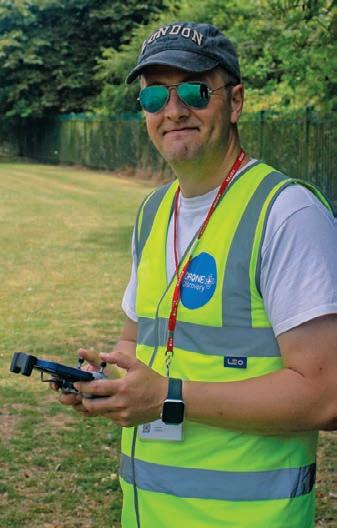
‘At
the heart of this revolution is the ability of drones to survey vast areas rapidly and accurately’






By Vicky Critchley (pictured), CEO, Truly SMB
Artificial intelligence has captured the world’s imagination. From streamlining admin tasks to unlocking new insights from data, AI promises to reshape the way we work. For small and medium-sized businesses (SMBs), the potential is huge.
Yet for many leaders, that promise feels out of reach. They can see AI transforming competitors, but the path to adoption often looks complex, costly, or simply overwhelming. That tension – between recognition of AI’s value and uncertainty about how to implement it – is defining the current moment for SMBs. It is also creating a critical opportunity for those businesses willing to engage with the technology in a practical, measured way.
According to Microsoft’s 2024 Work Trend Index, 79% of business leaders believe AI adoption is essential to staying competitive, yet 60% admit their organisation has no clear plan for implementation. This isn’t due to lack of ambition; it’s about not knowing where to begin. The AI conversation is saturated with hype, technical jargon and sometimes even fearmongering. Against that backdrop, it’s no wonder many owners and managers feel they’re running to catch up.
At the same time, SMBs possess unique advantages that larger enterprises envy: agility, entrepreneurial spirit, and the ability to pivot quickly. If they can overcome initial hesitation, these businesses are well placed to use AI as a growth accelerator rather than a distant aspiration.
One of the biggest barriers is perception. AI is often seen as futuristic or experimental, when in reality many of its most useful applications are accessible and affordable today. Automating repetitive admin, optimising supply chains and enhancing customer engagement are no longer the preserve of tech giants.
The turning point comes when SMB leaders experience tangible benefits – implementing a chatbot to reduce routine customer queries, or adopting AI-driven forecasting to manage inventory more efficiently, creates visible impact. These small but significant wins shift AI from an intimidating buzzword into a practical business tool.
Another area where AI can transform SMBs is in making sense of data. Most businesses already collect information


on customers, operations, and markets – but raw data alone doesn’t drive value. AI tools can analyse patterns, predict trends and provide insights that previously required a dedicated analytics team. For example, a retail SMB might use AI to forecast demand for seasonal products, reducing costly overstocking. A professional services firm could analyse client interactions to improve responsiveness and retention. In both cases, AI acts as a multiplier for human decisionmaking, not a replacement.
It’s important to stress that there is no one-size-fits-all route to AI adoption. What works for a logistics company will differ from what benefits a marketing agency or healthcare provider. Successful adoption hinges on aligning technology choices with the unique challenges and goals of each business.
For some, that might mean prioritising AI-driven cybersecurity to protect sensitive data. For others, it might involve marketing automation to reach new customers more effectively. The key is starting with the business problem and working backwards, rather than being dazzled by the technology itself.
AI adoption is not a single project with a fixed endpoint. It’s an ongoing journey, requiring regular assessment, adjustment and investment. The businesses that thrive will be those that view AI as a long-term partner in growth, not a quick fix. As we move deeper into 2025, the urgency for SMBs to engage with AI will only increase. Competitors who embrace automation and analytics will pull ahead, leaving late adopters struggling to keep pace. Yet the good news is that entry points are easier than ever, and the benefits more immediate.
The future of AI for SMBs is not about replacing people with machines, but about enabling people to do more of what they do best: serving customers, innovating, and building sustainable growth. For leaders, the challenge is no longer whether AI matters – it clearly does – but how to approach it with confidence and clarity.
The message is simple: don’t wait for the perfect plan. Start small, learn fast, and let AI become a catalyst for the future you want to create.

‘AI
adoption is not a single project with a fixed endpoint. It’s an ongoing journey, requiring regular assessment, adjustment and investment’



By Rob Twells, managing director and co-founder of The Digital Maze, which employs 30 people
The Digital Maze is a fullservice digital agency specialising in website design, SEO, and paid media. We help businesses grow online by improving their visibility, converting traffic into revenue and building future-proof digital strategies.
The company was formed following the acquisition of three respected Midlands-based agencies – Frogspark, Boom Online, and Evolve Retail – and we’ve since united under one brand, combining technical excellence with creative thinking.
As well as website design and

Addooco, originally founded as an IT partner for small businesses, has refreshed its brand identity to better reflect its shift into a fullservice technology advisor for UK businesses.
Established over a decade ago, Addooco has expanded beyond its early roots, providing IT infrastructure, consultancy and engineering services.
Chief executive Richard Walters said: “This wasn’t about a new logo, it was about clarity – illustrating our impact and the kind of business we’ve become: boardroom-ready, yet approachable.
“We’ve grown, our clients have grown, and the market has grown. This brand meets that moment – with focus, clarity and true representation of who we’ve become.”
He said the refreshed branding emphasised a clear commitment to delivering results and a recognition that progress means matching people with the right technology.
An updated website reinforces the new identity with a bold, streamlined design and quicker navigation.

development, SEO, content strategy, PPC, paid social advertising, data and conversion tracking, CRM and marketing automation, we also deliver strategic support across digital transformation projects, combining creativity, tech and marketing expertise under one roof.
We work predominantly with growing SMEs across sectors such as home & garden, lifestyle, manufacturing, SaaS, and servicebased businesses. Clients trust us because we speak their language, challenge assumptions and deliver measurable impact.
Like many agencies, we’ve seen shifts in client expectations, increased competition and rising operating costs. One key challenge has been maintaining strong margins while still delivering real
‘I’m personally very passionate about supporting the East Midlands business community’
value and quality. We’ve responded by restructuring parts of the business, tightening financial processes, investing in leadership development and refining our ICP [ideal customer profile]. We’ve also launched new service lines and improved our proposal and onboarding process – which has helped us win better-fit clients and grow average deal size.
We’re focused on three things: sustainable growth, productisation of our services, and staying ahead of the digital curve — particularly with AI and data-led marketing. We’ve recently launched a “Right Time Marketing” product for brands targeting home movers, and we’re investing heavily in automation and service efficiency – setting our sights on breaking the £3m revenue barrier over the next 18–24 months. We’ve been Chamber members for several years, and I’m very passionate about supporting the East Midlands business community. The Chamber’s networking events, training programmes, and business insights have been valuable over the years – especially as we’ve scaled.

Peak Media Marketing has moved to new offices in Coldwell Street in the historic market town of Wirksworth.
After several years of steady growth, the relocation marks an exciting new chapter for the company and a renewed commitment to being part of the local business community.
Although the agency works with clients across the UK and internationally, management said they place a big value in maintaining a physical presence in the region, where they can do business face-to-face and exchange ideas over a coffee.
Owners Chris and Sarah Spencer said Peak Media Marketing was more than just a marketing agency, but a business development partner – understanding
each client’s growth ambitions and using strategic marketing as the vehicle to get there.
The new Coldwell Street premises sits on one of Wirksworth’s key thoroughfares, offering strong visibility, accessibility and connection to the independent businesses in a town with more than 700 years of trading history. The space allows the team to host strategy sessions, workshops and client meetings in a more collaborative setting.
The business specialises in helping businesses “get seen on social and get found on Google,” offering services from SEO and social media management to branding and website development.






Amember of the Buckles Law team has been honoured for her resilience in the face of adversity.
Private client solicitor Molly Reek has received an outstanding alumni award from Nottingham Trent University (NTU) for her hard work despite facing terrible personal loss.
The firm said the award reflected her “remarkable resilience, sustained commitment to others and the positive impact she has made since entering the profession”.
‘Talented young solicitor using her experience to help others at life’s most challenging moments’
Molly’s journey into law began with the Sutton Trust Pathways to law programme in affiliation with NTU. She went on to read law at the University of Sheffield, graduating with the Thomson Reuters prize for law, and later completed the LLM legal practice course at NTU.
Along the way she faced tragedy when her younger sister Leah Reek was killed in the 2018 Hinckley Road explosion in Leicester. Leah’s boyfriend Shane Ragoobeer also died, along with his mother and brother and a person working in the shop downstairs.

Despite the loss, Molly returned to complete her exams, qualifying as a solicitor in 2022.
Today she is part of the private client team in Nottingham, advising on wills, trusts, lasting powers of attorney and estate administration – taking part in conversations that
typically occur at difficult times.
The firm said her blend of technical skill and lived empathy helped clients feel heard and supported.
A spokeswoman said: “She believes in honest, practical guidance that reduces fear and
replaces uncertainty with a clear plan.
“Molly’s contribution extends beyond the office. In Leah’s memory and inspired by her work at LOROS Hospice, Molly and her family have raised more than £60,000 to support palliative and end-of-life care.
“Fundraising has helped them process grief and turn pain into purpose. It also mirrors values we hold dear: community, compassion and action to make a difference.
“We invest in early career pathways, mentoring and wellbeing because the best client outcomes flow from people who are supported at every step.
“Molly’s story shows what that looks like in practice — a talented young solicitor using her experience to help others at life’s most challenging moments, backed by a team that shares her personal values.
“We also recognise the role Nottingham Trent University plays in opening doors to the profession. Many of our lawyers have studied there and we continue to collaborate with the university through recruitment, placements and alumni engagement. Molly’s award underlines the value of those partnerships and the impact they have on our region’s legal community.
“On behalf of everyone at Buckles, congratulations Molly and thank you for the example you set.”
Derby-based law firm Flint Bishop has acquired Lupton Fawcett with deal advisory services provided by PKF Smith Cooper.
Lupton Fawcett has offices spanning across Yorkshire, in Leeds, Sheffield and York, which will all be retained. It will allow Flint Bishop to expand its footprint across the north and will see the business headcount grow above 420.
The deal enhances the capabilities for Flint Bishop across commercial, employment, dispute resolution and litigation, property and private client services, as well as introducing new specialisms.
It anticipates becoming a Top 100 UK law firm by 2026.
It follows a record-breaking financial year for Flint Bishop in 2024/25, which saw revenue grow 53% to £31.9m.
Chief executive Qamer Ghafoor said: “Our

latest acquisition is a transformative step in our growth journey, enhancing our capabilities, broadening our geographic reach, and allowing us to deliver even greater value to our clients.
“Lupton Fawcett has a proud heritage and an outstanding reputation, and we look forward to welcoming our talented new
colleagues in Leeds, Sheffield, and York, supporting them with exciting career and development opportunities.”
James Richardson, managing partner of Lupton Fawcett, said: “Joining Flint Bishop represents an exciting new chapter for both our people and our clients.
“The cultural alignment and shared commitment to excellence made this a natural fit.
“This move ensures continuity and stability for our existing clients, while creating considerable opportunities for growth in Yorkshire and across the wider north of England as part of a truly national law firm.”
It is the second acquisition in the law sector that PKF Smith Cooper has provided deal advisory services for this year, having helped with the sale of Else Solicitors to Nelsons earlier this year.



Expanding your business is an exciting milestone that signifies growth and opportunity. However, it’s not a decision to be taken lightly. Whether you’re acquiring another company, entering new markets or securing additional funding, thorough due diligence is essential to ensure your expansion is built on a solid foundation.
Due diligence is the comprehensive process of assessing potential risks and opportunities associated with your transaction, ensuring informed decision-making.
It’s not just about uncovering financial health but also evaluating operational, legal and cultural factors that could impact the success of your venture.
Thorough due diligence enables you to: confirm the accuracy of financial information; have confidence in the valuation of the target business; identify exposure to risks such as debts, legal disputes or regulatory issues; ensure financial and legal compliance; understand operational
Rachel Rudkin (pictured left), director and head of transactional services at accountants and business advisors
Duncan & Toplis, considers the importance of due diligence when expanding your business.
efficiencies and challenges; ensure the cultural and strategic alignment of the target business
Neglecting this process can lead to costly mistakes, including overpaying for acquisitions or overlooking liabilities that could undermine your future success.
Financial assessments are the cornerstone of a due diligence process. This involves examining financial statements to review profit and loss, balance sheets and cash flow statements to assess the company’s financial health. Debts
Leicester-based Springfields Advisory Services has appointed experienced commercial banking specialist Phill Bateman as its business relationship manager, in a move that will help it grow and strengthen relationships with the region’s accountancy and legal sectors.
The business, which has been running for almost 25 years, provides strategic business advice to SMEs and owner-managed businesses facing financial pressure or restructuring decisions.
The team works closely with accountants, solicitors and lenders to offer early intervention and practical, commercially-focused solutions, including debt management, turnaround planning, and formal insolvency procedures.
Phill has more than 40 years of experience in business banking at Lloyds Bank, where he advised business owners across Leicestershire and the East Midlands on finance, structure and resilience strategies.
He said: “Joining Springfields feels like a natural next step. I’ve built my career around long-term relationships and helping clients take control of their financial future.
“Springfields shares that ethos – they’re known for getting to the heart of the problem, offering straight-talking advice, and working closely with all stakeholders to deliver results.
“I’m excited to bring my experience and network into a team that genuinely makes a difference.”
A De Montfort University alumnus, Phill has remained actively involved in

and liabilities, including outstanding loans and unpaid taxes, must be identified to understand their potential impact.
You should also verify compliance with tax regulations to avoid hidden liabilities and evaluate future financial performance by checking the assumptions that underpin growth predictions.
Independent financial reviews by experienced auditors will provide you with the

Fox’s
‘Financial assessments are the cornerstone of a due diligence process. This involves examining financial statements to review profit and loss, balance sheets and cash flow statements to assess the company’s financial health’
transparency and reassurance needed to make informed decisions.
Understanding the legal landscape is also crucial. This includes reviewing contracts with customers, suppliers and employees; verifying ownership of intellectual property, licenses and permits; checking for ongoing or potential litigation; and ensuring compliance with industry-specific regulations.
Addressing legal issues early will help you avoid significant setbacks post-expansion.
The operational structure and cultural alignment of a target business are often underestimated aspects of due diligence. You should evaluate key personnel, organisational structure and operational processes to identify strengths and gaps.
Supply chain contracts, logistics and dependencies must also be assessed and IT infrastructure reviewed for compatibility.
Cultural compatibility should also be considered to ensure the values and practices of the target

business align with yours, because problems here can lead to challenges in integration, team retention and overall performance post-expansion.
Tax efficiency is a critical element of any expansion strategy. Whether you’re structuring a merger or securing funding, you should explore tax relief opportunities, understand the implications of transferring assets, shares or liabilities and plan for VAT and other taxes.
Specialist advisers can help you navigate these complexities, ensuring compliance and maximising savings.
Expanding your business is a significant undertaking but with robust due diligence, it can be a transformative step forward.
By carefully evaluating financial, legal, operational and cultural factors, you can confidently mitigate risks and seize opportunities as you move forward.
The due diligence process often requires input from a range of professionals.
Derby-based accountants and SME business advisors Dains Group has made its third acquisition since securing private equity backing from IK Partners.
The business has bought TBAT Innovation, an independent consultancy that helps businesses access research and development (R&D) tax incentives, grant funding and innovation support.
Founded in 2002, TBAT has built a reputation for delivering advice across engineering, software, AI, and health and life sciences –underpinned by sector knowledge in high-growth, technology-related industries.
Its expertise in unlocking funding, optimising R&D claims and navigating complex innovation incentives will enhance Dains’ existing tax and advisory services.
The TBAT team will continue to

operate under the leadership of managing director Ryan Mouncy, founder and commercial director Sam Stephens and finance director Elaine Williams.
Dains Group chief executive Richard McNeilly said: “TBAT’s leadership team shares our clientcentric mindset and commitment to delivering valuable advice.
“Its expertise in R&D tax incentives, grant funding, and innovation support will not only strengthen our specialist tax and advisory services, but also open new opportunities for clients to access funding that fuels growth.
TBAT founder Sam Stephens said: “We’ve always been passionate about helping businesses unlock funding and maximise the opportunities that come from innovation. Dains allows us to bring that expertise to even more clients.”



East Midlands Mayor Claire Ward, education minister Bridget Phillipson and Derby MP Baggy Shanker mark Derby College Group’s designation as a Construction Technical Excellence College
Derby College Group has been selected as one of nine in the UK –and the lead for the East Midlands –to become a Construction Technical Excellence College (CTEC).
The group already supports more than 1,000 learners on its construction programmes and has the largest number of construction apprentices in the region.
Becoming a Construction Technical Excellence College means it has been recognised by the Department for Education as a national leader in delivering highquality, industry-relevant construction training.
The new status will bring additional investment, collaboration opportunities and influence in shaping the future of skills provision.
As the East Midlands’ lead, DCG will coordinate training and share best practice with other colleges and employers when it comes to advanced technical, green and digital skills. The CTEC will work in close partnership with the East Midlands Combined Authority and other partners.
Derby College Group chief executive Mandie Stravino OBE said it was an “incredible achievement”.
Andrew Cochrane, chair of the governors at the college group, said: “This is testament to our outstanding teaching teams, strong employer partnerships and the ambition we have for both our learners and the wider region.”
Mayor of the East Midlands Claire Ward said: “We have ambitious plans in our region to grow our economy and build thousands of new homes. To achieve that, we’ll need thousands of new skilled construction workers.
“Derby College Group will be right at the heart of shaping the future of construction in our regions.”

East Midlands Chamber has entered into a new strategic partnership with Leicester College. The collaboration brings the college and the Chamber together with business leaders and decision-makers, and will encouraging the sharing of insight with the East Midlands business community and help shape future policy over issues such as the skills agenda in Leicester and Leicestershire.
The college will also continue its partnership with Generation Next – the Chamber network that seeks to inspire future leaders and entrepreneurs in the East Midlands aged 18-35.
‘This strategic partnership will be of significant benefit in addressing challenges and opportunities with policymakers’
Spread across three campuses in Leicester, the college boasts industry standard facilities and offers a range of courses from entry level to level 6, T levels and higher technical qualifications.
Chamber chief executive Scott Knowles said:
“Equipping students with the skills or qualifications to drive progress forward in workplaces in the years ahead is essential to economic growth.
“With our latest Quarterly Economic Survey having highlighted the importance to employers of finding skilled candidates to fill vacancies, it’s more important than ever to engage with educators,


businesses and to lobby policymakers for the best local skills agenda for Leicester and Leicestershire.
“Building on our long-established collaboration with Leicester College, this strategic partnership will be of significant benefit in addressing challenges and opportunities with policymakers.”
Leicester College principal and chief executive Shabir Ismail said: “Through its involvement in the delivery of the Local Skills Improvement Plan, East Midlands Chamber has shown its commitment to working with further education colleges such as Leicester College to develop an education and skills offering matched to what businesses need.
“We’re delighted to extend our partnership with the Chamber to amplify the skills agenda regionally and continue to shape the business landscape for current and future students coming into the workplace.”

The new academic year has commenced at Loughborough College and SMB (Stephenson, Melton and Brooksy) College Group following their merger.
The merger, initially proposed in July 2024, was finalised following a consultation process involving students, staff, parents, employers and the wider community with the newly formed Loughborough College Group combining the strengths of both organisations and “delivering enhanced opportunities for students and businesses across the region”.
Group chief executive Corrie Harris said: “We are proud to launch Loughborough College Group and begin this exciting new chapter.
“This merger brings together the best of both colleges, unlocking new potential for innovation, investment and opportunity. Our focus remains on delivering an exceptional student experience and developing the skills that will power the future economy.”
She said the merger strengthened the region’s educational offer and supported the group’s longterm growth plans, including more than £55m of investment in initiatives such as the East Midlands Institute of Technology and a landbased agri-tech centre at the Brooksby campus, which is in the countryside near Melton.
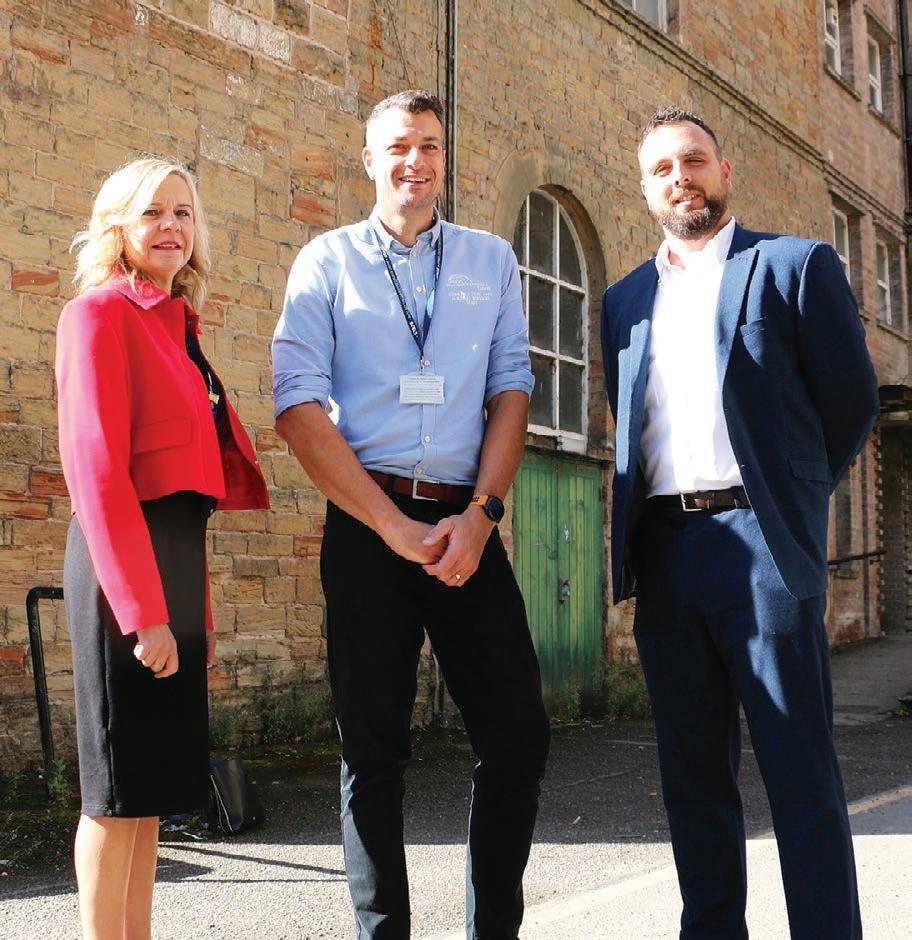
West Nottinghamshire College is celebrating national recognition for its high standards in apprenticeship training and assessment after being awarded a City & Guilds End Point Assessment (EPA) Excellence plaque.
The plaque, presented at the college’s construction site in Pleasley Vale Business Park, highlights its reputation as an excellent End-Point Assessment (EPA) centre.
It was presented by Jonathan Price, City & Guilds Midlands business development manager, who joined vice principal for curriculum and quality Diane Booth, apprenticeships manager Paul Stringer and members of the construction team.
Mr Price, who oversees 32 colleges across the Midlands and South Yorkshire, said: “We nominated centres based on
success rates, learner experience, quality of facilities, and the strength of our relationships with staff.
“West Nottinghamshire College is well above benchmark in construction EPA pass rates, and the commitment of tutors and managers is clear to see. It’s a thoroughly deserved award, and I was delighted to present it here.”
At Pleasley Vale, students undertake EPAs in carpentry, plumbing and heating, painting and decorating, and refrigeration. The facilities replicate a real working environment for apprentices undergoing assessments.
Sites in Sutton-in-Ashfield and Kirkby-in-Ashfield deliver bricklaying, plastering, and property maintenance – with new pathways, such as low carbon heating technician, being introduced soon.
Loughborough University Is looking for businesses to host internships this autumn, giving them the chance to work with students from different disciplines to bring new perspectives into their operations.
The 2025/26 Talent Match Internship Scheme is accepting submissions until mid-October and offers structured guidance on finding the right student for different positions, and offering regular check-ins and feedback throughout the whole process.
The scheme operates 50 hours internships for year one and two students; 50 hours for final year students and graduates; and 100 hours placements for postgraduate students.
There is even the potential of funding for small and medium-sized businesses that sign up.
To find out more, email employer.services@mailbox.lboro.ac.uk or visit: https://is.gd/u5vwTk
Give a young person real experience and your team real capacity
Hosting a Homefield College work placement helps you develop future talent, strengthen culture and deliver social value – with no cost and minimal paperwork At Homefield we specialise in supporting autistic students to gain the skills, confidence and workplace behaviours employers need.
Just three in 10 autistic adults are in work – a gap you can directly help close by offering structured placements that build skills and networks. (National Autistic Society, 2024)
• Proven pipeline effects: Employers who engage with schools and colleges report clear benefits – 81% say their outreach helps develop new talent pipelines and 37% see reduced recruitment costs. Work placements are a practical route to those gains. (The Careers and Enterprise Company, 2024)
• Aligned with national policy: Government guidance now expects every student to have meaningful experiences of workplaces, with a planned guarantee of two weeks’ work experience – making employer participation simpler and more common. (GOV.UK, 2025)
• Delivers social value: Placements help evidence Social Value commitments in bids (PPN 06/20 and the updated 2025 model), particularly around tackling economic inequality and opening opportunities.
(GOV.UK, 2025)
WHAT YOU’LL GAIN
• Fresh capacity: Work placements bring new energy and practical support. Students can take on tasks in retail, catering, administration or digital, freeing your staff to focus on higher-value projects. With clear direction, they quickly become a productive part of the team.
• Cultivate leaders: Supervising a student helps employees grow as mentors and managers. This boosts confidence, communication and morale, while strengthening team cohesion.
• Neurodivergent strengths: Autistic students often bring precision, reliability and fresh problem-solving perspectives. Their input can spark innovation and raise quality across your business.
• Social value in action: Placements show a real commitment to inclusion and social mobility. They enhance your reputation, strengthen bids through Social Value reporting and resonate with customers, staff and investors.
• Future talent pipeline: Placements act as a low-risk “test and train” model. Students who know your culture and expectations from the start are easier to recruit, quicker to onboard and more likely to stay.
• Disability Confident: Show your commitment to inclusion with a Disability Confident status.
• Flexible formats: One day a week for six weeks, or short block placements, designed around your operations and seasonality.
• Right-fit matching: We align student interests and skills to your roles, agree goals and reasonable adjustments and brief your team.
• On-placement support: Check-ins from our staff, progress reviews and a simple wrap-up so you can quantify the impact.
• Ready for the new Gatsby Benchmark 6: We ensure placements are meaningful, structured and outcomes-focused.
Whether you’re an SME building a values-driven team or a larger organisation tackling skills gaps, a Homefield work placement is a practical, evidence-based way to grow future talent – and make a real difference for local young people.
Start the conversation: employers@homefieldcollege.ac.uk 01509 815 696 www.homefieldcollege.ac.uk


Construction and development group
Bowmer + Kirkland Group has acquired £40m turnover office fit-out specialist Denton.
London-headquartered Denton has been in business for more than three decades, delivering projects across the UK.
With the backing of Bowmer + Kirkland – a £1.25bn national group with more than 100 years of heritage – it will be able to take on larger and more ambitious projects.
Bowmer + Kirkland chairman Jack Kirkland said: “We are delighted to welcome DENTON into the Bowmer + Kirkland Group.
“Their track record of growth, creativity and client focus makes them a natural fit with our values. Together, we can expand
‘Their track record of growth, creativity and client focus makes them a natural fit’
opportunities, deliver larger and more ambitious projects and continue to raise standards in office design and fit-out.”
Denton founder Mike Halewood said it was a “hugely exciting” new chapter for the business.
He said: “Being acquired by Bowmer + Kirkland Group gives us the scale and stability to deliver even greater value for our clients — while keeping our commitment to design excellence, responsible operations and creating workplaces that support health, wellbeing and collaboration.”

The agents for the East Midlands Distribution Hub in Melton Mowbray are bringing to the market three “high calibre” warehouses or potential production units, each of which will be available to buy or rent.


Joint agents FHP Property Consultants, Incore and Colliers said the properties would be ideal for a business looking for substantial space on their own campus or alternatively individual occupiers looking to buy or rent warehouse or manufacturing space in a secure environment.
The three buildings offer a combined 665,000 sq ft of space, ranging from the 160,000 sq ft to more than 300,000 sq ft, and benefit from expansion land, which is available to buy or rent by separate negotiation.
The agents said: “This is quite a unique opportunity, with three excellent warehouse or potential production units with excellent loading and distribution facilities which are immediately available.”

Derbyshire-based Bowmer + Kirkland Group has been behind a number of big projects in Derby, including Vaillant Live and Derby Arena. As well as London, Denton has offices in Manchester and Liverpool. The company will continue to operate under the Denton brand with its existing leadership team.
Law firm Flint Bishop advised Bowmer + Kirkland on the deal.
The transaction was led by partner and head of corporate Martyn Brierley and partner Mark Wilcock, with additional expertise provided by Janet Rhodes, Haroon Younis, Joseph Weston, Robert Devine and Jessica Ryan-Dawkins from Flint Bishop’s real estate, commercial, corporate and employment teams.

Chartered surveyor Fisher Hargreaves Proctor (FHP) has donated to Nottingham charity Footprints Conductive Education Centre, enabling it to progress with the next phase of work at its new centre in Clifton.
FHP, which has offices in Derby, Nottingham and Birmingham, chose Footprints to help with the big renovation project of its new HQ at the former Highbank Community centre in Clifton.
Footprints’ new accessible hub for children with mobility and communication difficulties opened to families in June.
Phase one works saw facilities installed including dedicated education session rooms, a speech and communication room, an accessible children’s toilet training room and family room.
A donation from FHP will enable the charity to start work on its sensory room, designed to
accommodate the needs of children and adults of all abilities.
The funds will also allow works to begin on a coffee bar, giving Footprints families space to connect, share experiences and support one another in a relaxed environment. It will also be open to the public.
FHP is also making introductions to local firms who might be able to help with the asphalting of the car park and solar panel installation.
Ashby-based workplace consultancy Blueprint Interiors has been instrumental in enabling the charity to relocate from Sneinton school, by project managing and sourcing donated materials to transform a vacant building into a fully accessible centre for children and families living with disabilities.
Footprints continues to seek donations and volunteers. If you would like to help, contact enquiries@footprintscec.org









Mazda MX-5 RF 2.0-litre
PRICE OTR
From £34,400
PERFORMANCE
Top speed: 136mph
0-60 mph: 6.7 seconds POWER
185 BHP ECONOMY
42 miles to the gallon




The MX-5 has the feel of a traditional rear-wheel-drive

Journalist Nick Jones tests an iconic car on today’s roads, the Mazda MX-5
I’ve been doing some thinking lately and one thing that stirs my senses is the lack of driving aptitude shown in most cars that you can buy today.
I think back to the likes of Ayrton Senna and Nigel Mansell wrestling at the controls of F1 cars – having to really drive them to get the most out of them. The same can’t really be applied on the track today, as most cars virtually drive themselves, with little input from the pilot.
Out on the roads, cars have followed the same principal, with a myriad of computer-controlled assistance to take all the fun away from wholesome driving.
In effect we’re becoming detached from the responsibility we all have when we take to the road – which is to firmly be in control.
But there is one car that bucks the trend in the form of the Mazda MX-5.
Launched 35 years ago, this little sports car brings back the driver involvement, as it has the traditional feel of rear-wheel-drive and very few driver aids.
The engine line-up of 1.5 and 2.0-litre units remains the same across the eight models in the range, with four roadsters and four RFs (retractable fastbacks), and a choice of three trim grades.
On the road, one feels in symmetry with the car and in total harmony, fully in control which is a nice feeling should you hit some fast, flowing tarmac. On the inside, I had a larger touchscreen display along with an updated instrument panel and one feels it has not only the look but the feel of something special.
Driver aids there aren’t many, but that’s the whole point – it’s a driver’s car that puts you and not the car as the centre of attention. That, I feel, in today’s conglomerate of ease in which you can drive, is worthy of closer inspection in such a delightful ‘old school’ motor.
‘This little sports car brings back the driver involvement, as it has the traditional feel of rear-wheel-drive and very few driver aids’






Chamber president Dawn Whitemore on making the energy market a better fit for industry needs.
Common sense would state that for businesses and communities to have any chance of thriving, then essential commodities such as energy and water must be kept at an affordable level.
We all understand that in recent years, the UK’s energy sector has been hit hard. The COVID-19 pandemic caused a big jump in energy demand with more people working from home and businesses changing how they operated.
All of which resulted in an increase in demand. Combined with disruptions in the supply chain and the significant political tensions around the world, this has led to huge increases in energy prices, more so in the UK.
‘The current economic climate has created an environment where businesses are having to completely rethink their investment strategy’
Ten-year predictions indicate that energy prices will continue to rise if we don’t make significant changes now. No change, will inevitably see energy prices continue to impact negatively on all UK businesses, stifling growth and job creation further.
So why is it that successive Governments have struggled to put in place policies that safeguard and ensure these resources are available at an affordable cost for businesses and consumers?
I appreciate that we have a myriad of Government schemes, some helpful but none ideal, some seen as punitive, often short-term. Auditing businesses for energy efficiency for example, sounds helpful but often the investment needed to implement the audit findings/recommendations simply are not affordable or practical for many businesses. There are some grants and loans, but these are insufficient most of the time. Elsewhere, countries have been evolving 50-year energy strategies,

Businesses need the government to keep energy prices at an affordable level


not ones defined by a political party or based upon an electoral cycle. So why not here?
Dare I suggest that we need to keep things simple. Simplification would reduce civil servant administration, audit and regulatory costs from the process.
For example, what would be the impact for all businesses if the Energy Price Cap (set by OFGEM) was applicable to every business in the UK (currently the Energy Price Cap is only for domestic households).
Surely, this would be one way to help our businesses have a more stable environment, to plan with certainty, and one where the criteria could be engineered around what was good for supporting British businesses (making it fair, transparent and already tested).
Here in the East Midlands, where we are proud
to be home to large global brands and have one of the highest densities of small and micro businesses, energy is no longer simply a cost to manage but is a strategic factor that can even determine survival in some sectors.
High, volatile prices, regulatory pressure, infrastructure issues and competition all combine to make energy policy and business energy strategy central to future resilience.
The current economic climate has created an environment where businesses are having to completely rethink their investment strategy –with some businesses now relocating their operations to countries with lower energy costs so they can remain competitive.
My plea to the Government, rethink the energy policy – one simple change could be the catalyst that starts to build back business confidence.

